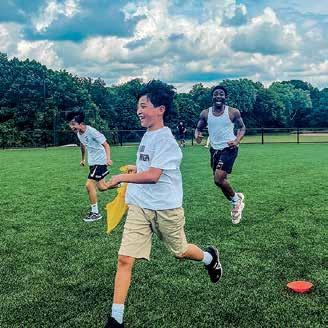

Summer

Summer

TOP 10 REASONS TO SPEND YOUR SUMMER@TAFT
10 8 9
The opportunity to become STRONGER academically, physically and emotionally. GROWTH LOOKS GOOD ON YOU. 7 4 5 3 6 2 1
Think big, think global: Meet new FRIENDS from across the U.S. and around the world.
Increase your INDEPENDENCE in preparation for college.
TEST DRIVE boarding school.
Your summer is all about CHOICES: take new courses like organic farming, learn computer programming, try yoga, or write a song. One thing that you won’t be is bored.
Want to work on your GOLF game? We’ve got that covered, too.
YOU BELONG HERE: whether you are an artist, a writer, an athlete, or a scientist—from nearby or faraway—there is a place for you.
Time to RELAX can mean challenging your advisor to a game of ping pong at the Jig, sampling pizza in town, chatting with friends by the pond, watching a movie, or working out at the gym.
Dynamic FACULTY: they’re passionate about their subject, committed to teaching, and love what they do. You’ll get to know them as teachers, coaches, dorm parents, and advisors.


Welcome
In today’s world, there are ever increasing options in how young men and women can spend their summer. Summer@Taft’s academic enrichment program is designed to broaden your horizons and to stimulate and encourage intellectual curiosity and growth.
At Summer@Taft, we believe strongly that you should have CHOICES. To that end, we offer an individualized academic program, which enables you to further your academic progress by choosing a course of study that suits your personal needs and interests and allows you to hone your skills and deepen your understanding.
Beyond the classroom, you are provided with choices in other areas of life as well. From deciding which sport to play, to cultivating new friendships, to boundless extracurricular activities, being offered a myriad of options provides you with a sense of independence and the ability to control your success and happiness through the choices you make. The results are often “teachable moments” where you learn about making smarter choices in a safe and nurturing environment. Experienced and caring faculty mentors will work with you to explore your options and provide support, if needed.
Expect to be surrounded by passionate faculty and teachers who want to share knowledge and skills. Instructors, including some of the finest from the Taft faculty, share a love of learning with their students. The strength of the faculty lies in its ability to connect with you and help guide and support you and, when necessary, push you beyond your comfort zone.
You’ll have the unique opportunity to get to know your teachers outside of the classroom as coaches, chaperones, dorm parents, and advisors. These interactions, whether in the residential community, during field trips and group outings, or on the playing field, foster a personal connection that invigorates learning.
We invite and encourage you to look through the catalog and explore our website. At Taft, we feel fortunate to be able to offer our students this superb summer opportunity and hope that, after perusing our catalog and learning more about us, you will choose to be a part of it.

Ryan T. Gemmell co-director
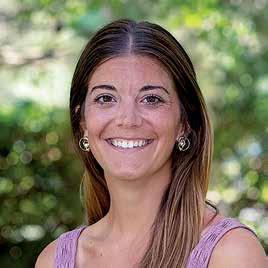
Rebecca Swift co-director
Who
WILL BE TEACHING YOU?
We select summer faculty based on their excellence in teaching and their commitment to young people.
Most are chosen from Taft’s regular school year faculty and from other independent schools; in addition, several teachers from public schools join our faculty for the summer. We also select several outstanding college juniors, seniors, or recent graduates who are interested in a career in education to assist the faculty. These interns are mentored by senior teachers and work in all aspects of campus life. They are an essential part of the summer experience, and our students often form lasting friendships with these young adults. Your teachers and interns become your advisors, mentors, dorm parents, and coaches. They’ll greet you on registration day, accompany you on weekend trips, become your teammate, make popcorn and watch movies with you, but most importantly, they’ll push you to succeed. You will be assigned an advisor at the end of the first week of classes. This adult is a fantastic resource for you in all areas of life at Taft. The advisor will oversee your progress and report to your parents in writing at the end of the program. In addition to the feedback from the advisor, parents can expect to receive a comprehensive grade report that will include a description of the work covered in each course and a report on the student’s progress as well as achievement and effort grades.
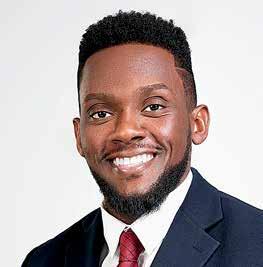
H
SEMAJ CAMPBELL ’14
Semaj is a member of the Taft class of 2014. After Taft, he attended Trinity College, graduating with a BS in psychology. After obtaining his undergraduate degree, he worked at Avon Old Farms and pursued his MFA at Lesley University with a concentration in photography, where he received the Lesley University Art and Design Rising Artist Award. Returning to Taft in 2025, he teaches photography and coaches football. His goal as an educator is for students to find an outlet to express themselves through the visual arts, since art serves as an unparalleled language through which humanity can effectively communicate in moments where verbal expression proves inadequate.
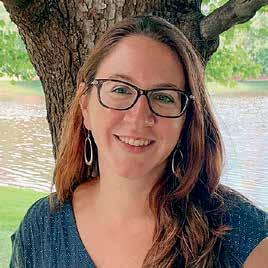
H MARIE BUTTERLY
Marie graduated cum laude from Emerson College, where she majored in Writing, Literature, and Publishing. After graduating, Marie obtained certification and a Master’s degree from Southern Connecticut State University. Prior to joining the Taft faculty, Marie taught for twelve years in the Connecticut public school system. During her tenure, Marie created curriculum for several courses, and served as the advisor to the school newspaper and the creative writing club. As a dedicated teacher and advisor, Marie is passionate about helping students discover their own interests and voices as readers and writers. She enjoys getting to know students through a shared exploration of novels, poetry, film, music, and more. Marie lives in Watertown with her husband, Rory, and twin sons, Jack and Brody.
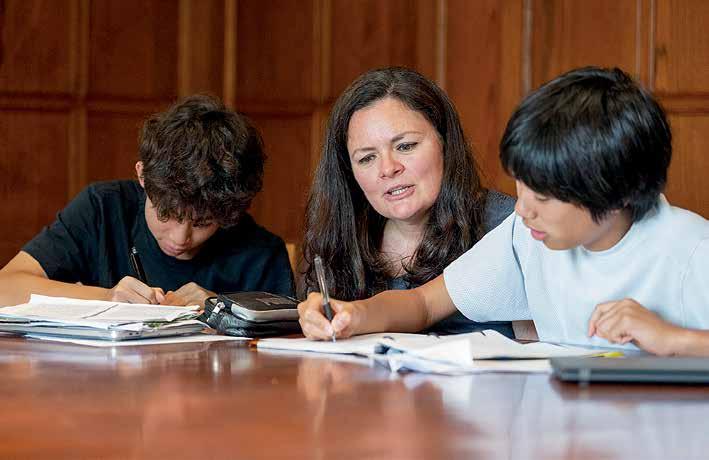
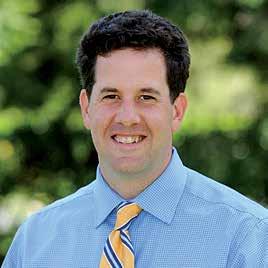
H THOMAS ANTONUCCI
Tom is a proud graduate of The Holderness School in Plymouth, NH. He earned a bachelor’s degree in history from the University of New Hampshire, with a concentration in modern America. Later, Tom received an M.A.T. degree with a concentration in European studies. At Taft, Tom has held various roles such as Associate Dean of Students, Director of Summer@ Taft, and dormitory head, A member of the Taft History Department, Tom has also served as department head. He currently holds the Independence Foundation Chair II, which was awarded in 2025 and recognizes a faculty member for their service as a teacher. He is also the Head Coach of the softball team at Taft.
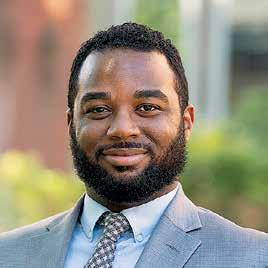
H SAMUEL ROSARIO
Samuel graduated from Bowdoin College with a BA in both Asian studies and Government and Legal Studies. His previous experience includes lifelong mentoring of new college students transitioning from high school. This true New Yorker worked as a tour guide of Native American culture at the world-renown American Museum of Natural History and helped educate students of all ages. While accumulating academic achievements at Bowdoin, Samuel would find respite in the studio as captain of the Brazilian jiu jitsu team or the college dining hall where he improved his recipe book. Samuel also earned his master of science in education (M.S.Ed) from the University of Pennsylvania which culminated in a research project examining studentcentered learning and the further development of student empathy.
Thank you very much for the report card and for this amazing experience. My son gained so much at Taft and was very happy. Please thank his teachers, coaches, staff, and everyone who made my son’s education experience a memorable one.

H EMILY ESTES
Emily Estes graduated from the University of Alabama in 2020 with a BA in public relations and minors in English and graphic design. She competed on the university clay shooting team for three years where she attended two national competitions in San Antonio, Texas. Emily began her teaching career in Georgia in 2020 and received her MEd in 2022. During her career she has taught multiple English courses, coached girls’ lacrosse, and led a student group to Tokyo, Japan. When not working, Emily enjoys reading 50 books a year, trying new food, or playing with her Golden Retriever, Murphy. Emily teaches English at Taft and also serves as the yearbook advisor.
—Summer@Taft Parent
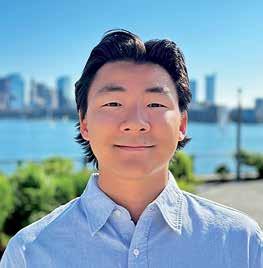
H YOUNG HUR
Originally a Long Island, New York, native, Young graduated from Deerfield Academy where he played water polo, captained the varsity swim & dive team and played as a starting attackman on varsity lacrosse. After receiving a BS in management from Boston College focused in information systems & business analytics, Young stayed in Boston working as a consultant in pharmaceuticals and investment banking, most recently in the AI startup space. As a UPenn teaching fellow at Taft, Young teaches mathematics.
My favorite class at Summer School was Literature & Composition. I enjoyed the short stories we read in class, especially “The Cask of Amontillado.” I also loved doing yoga for the first time and learning how to meditate. Making friends from all over the U.S. and the world ended up being a favorite memory.
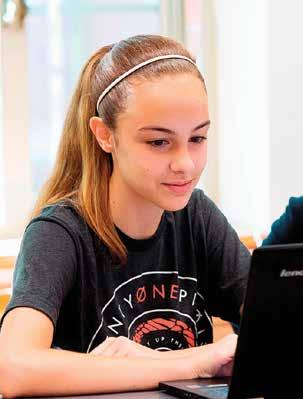
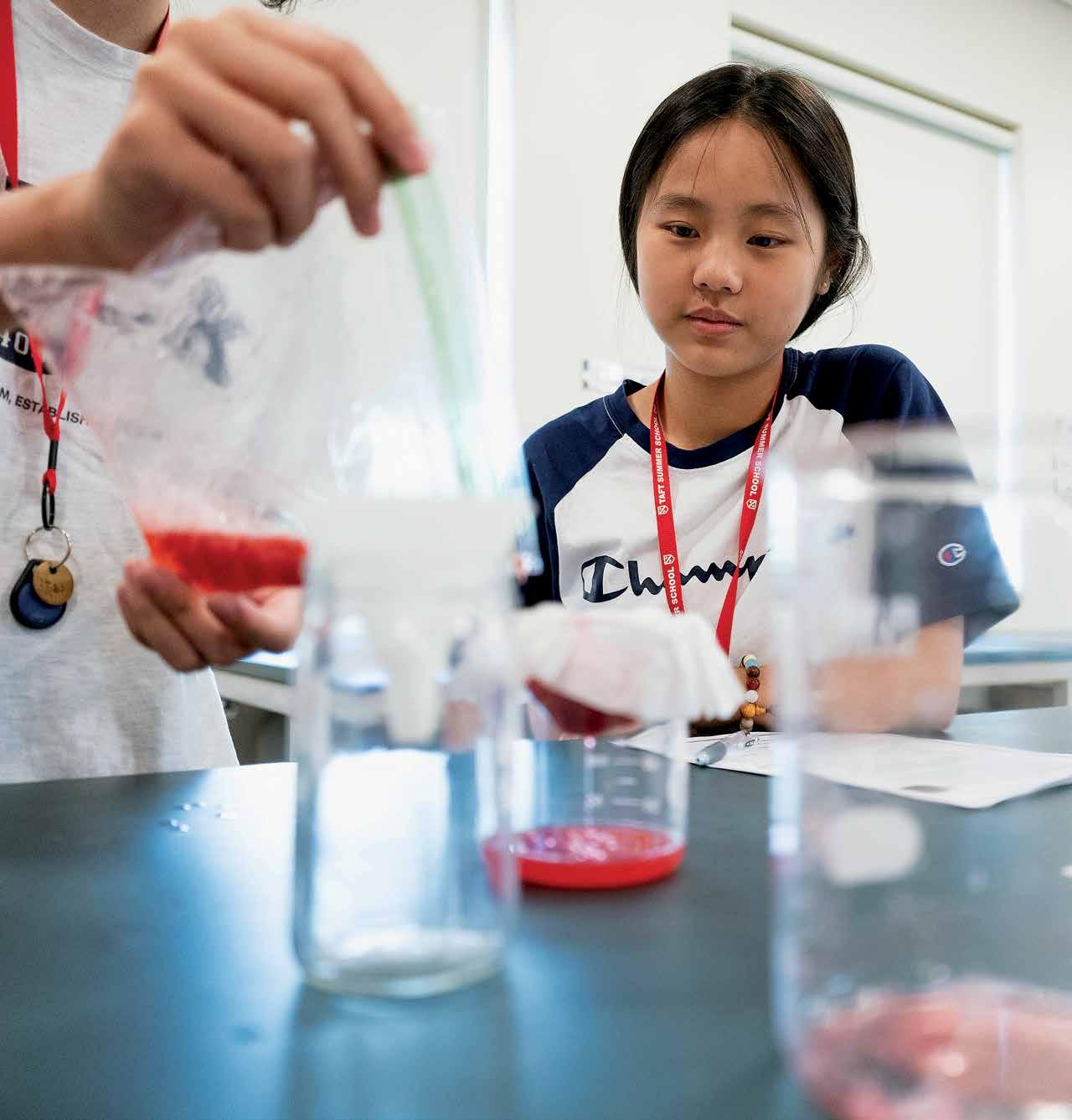
YOUNG SCHOLARS COURSE OFFERINGS
R
R Mathematics
Algebra
R Social Sciences
Clay Workshop for Young Scholars
YOUNG
ENTERING GRADES 7 AND 8 June
27–July 31, 2026
Scholars
R WHO SHOULD APPLY?
Whether your goal is to explore the boarding school experience or gain confidence for the upcoming school year, the Young Scholars program is designed for middle school students who intend to take on rigorous public and private secondary schools. You can expect to build essential skills, increase your independence and self-confidence, and improve your time management. Students must be 12 years old by June 1, 2026.
DAILY SCHEDULE
R 7:00–8:00 Breakfast
R 8:00–8:30 Meetings
R 8:30–9:15 Class 1
R 9:30–10:00 Community Time
R 10:00–10:45 Class 2
R 11:00–11:45 Class 3
R 12:00–1:00 Lunch
R 1:00–1:45 Electives
R 2:00–2:45 FLEX
R 3:00–4:30 Afternoon Athletics
R 5:00–6:00 Dinner
R 6:00–7:30 Free Time
R 7:30–9:00 Study Hall
R 9:00–9:45 Dorm Bonding
R 10:30 Lights
ELECTIVE COURSES
In one of the afternoon blocks, students will participate in elective-style courses and will have the opportunity to choose, upon arrival, which course they would like to take for the duration of the five-week program. Examples of potential offerings include, but are not limited to:
R HOW DOES IT WORK?
Based on your goals and personal interests, you’ll select Core Academic Classes from the Young Scholars Course Offerings. Electives will be chosen after arriving on campus. Potential elective class choices can be viewed below. Outside the classroom, you’ll take full advantage of all the cultural, athletic, and recreational opportunities offered.
In the dorms, you’ll be living with students of the same age and gender. Typically, you’ll be assigned a roommate.
R ACADEMIC COUNSELING
If your goal includes attending a boarding school full time, we encourage you to meet with your advisor, teacher, and an admissions officer to help develop a strategy for successfully meeting the demands of a college preparatory curriculum. By taking advantage of these resources, you will gain a clearer sense of what will be expected of you and how to meet these expectations in an organized and systematic fashion.

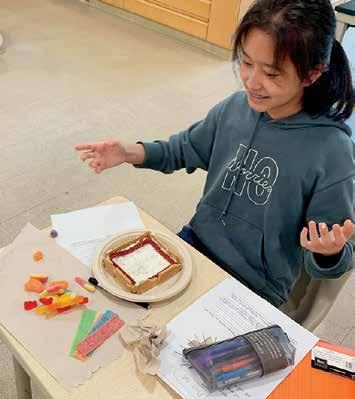
R Acting
R Contemporary Environmental Issues
R Forensic Science
R Journalism
R Organic Farming
R Painting and Drawing
R Introduction to Digital Photography
R Public Speaking
R The Research Paper
TEST PREPARATION
*249. Preparing for the SSAT Exam
See page 38 for details.
*Requires an additional fee
STUDIES liberal
DAILY SCHEDULE
R 7:00–8:00 Breakfast
R 8:00–8:30 Meetings
R 8:30–9:15 Class 1
R 9:30–10:00 Community Time
R 10:00–10:45 Class 2
R 11:00–11:45 Class 3
R 12:00–1:00 Lunch
R 1:00–1:45 Electives
R 2:00–2:45 FLEX
R 3:00–4:30 Afternoon Athletics
R 5:00–6:00 Dinner
R 6:00–7:30 Free Time
R 7:30–9:00 Study Hall
R 9:00–9:45 Dorm Bonding
R 10:30 Lights
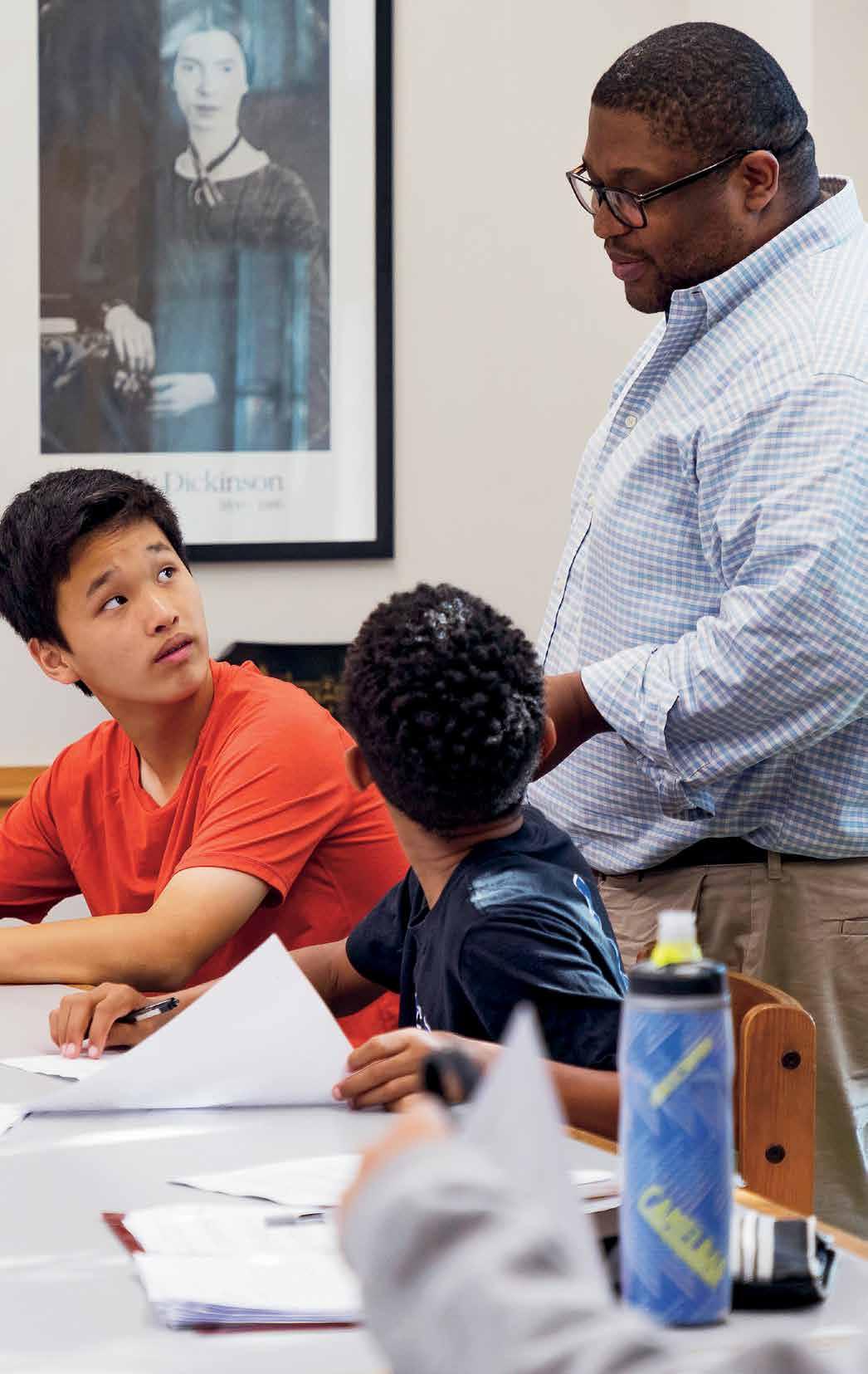
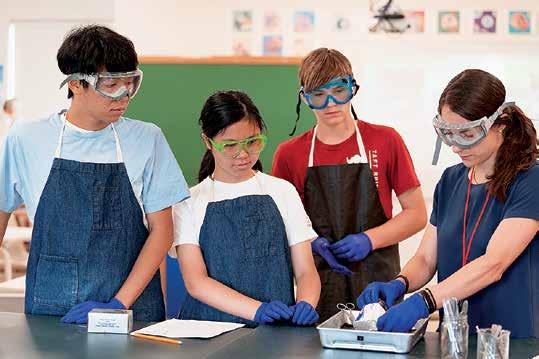
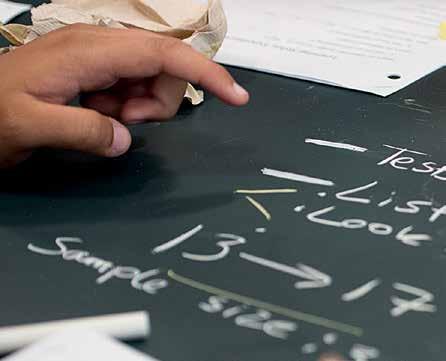

LIBERAL STUDIES COURSE OFFERINGS
CORE ACADEMIC COURSES
R English
111. Literature and Composition II
113. Creative Writing
R Mathematics
121. Algebra I
122. Geometry
123. Algebra II
124. Pre-Calculus
R Science
131. Biology for Liberal Studies
133. Chemistry
134. Physics
135. Intro to Computer Science
137. STEM
150. Psychology
R Languages
140. Conversational English
145. English as a Second Language
142. Spanish I
143. Spanish II
R Social Sciences
151. Early American History
152. 20th Century U.S. History
153. 20th Century U.S. History ELL
154. Current Events
155. International Affairs
R Arts
160. Drawing
161. Painting
163. Studio Art
164. Photography
166. Clay Workshop for Liberal Studies
ELECTIVE COURSES
In one of the afternoon blocks, students will participate in elective-style courses and will have the opportunity to choose, upon arrival, which course they would like to take for the duration of the five-week program. Examples of potential offerings include, but are not limited to:
R Acting
R Contemporary Environmental Issues
R Forensic Science
R Journalism
R Organic Farming
R Painting and Drawing
R Introduction to Digital Photography
R Public Speaking
R The Research Paper
TEST PREPARATION
*249 Preparing for the SSAT Exam
*259 Preparing for the SAT Exam
See page 38 for details.
*Requires an additional fee
ENTERING GRADES 9 AND 10 June
27–July 31, 2026
R WHO SHOULD APPLY?
This program is ideal for high school students who are interested in studying a variety of liberal arts courses in an independent school environment.
You will be able to sharpen your academic and testtaking skills, increase your independence, and improve time management, as well as broaden your cultural and global awareness as you prepare for college and beyond.
R HOW DOES IT WORK?
Based on your goals and personal interests, you’ll select Core Academic Classes from the Liberal Studies Course Offerings. Electives will be chosen after arriving on campus. Potential elective class choices can be viewed on this page. Expect to encounter small classes, engaging teachers, and courses designed to encourage lively and thoughtful discussions.
Outside the classroom, you’ll take full advantage of all the cultural, athletic, and recreational opportunities offered.
In the dorms, you’ll be living with students of the same age and gender. Typically you’ll be assigned a roommate.
R ACADEMIC CREDIT
Taft does not offer academic credit for courses offered during the summer. However, we will gladly forward a syllabus of work covered and final grade reports to a student’s school, if requested. Taft’s summer courses are not designed to review an individual student's yearlong course, but instead will serve as an excellent preview for an upcoming fall class.
I was able to sit and talk with my teachers at Taft. I was surprised to get to know them as real people who can be funny, athletic, and interested in similar things.
YOUNG SCHOLARS
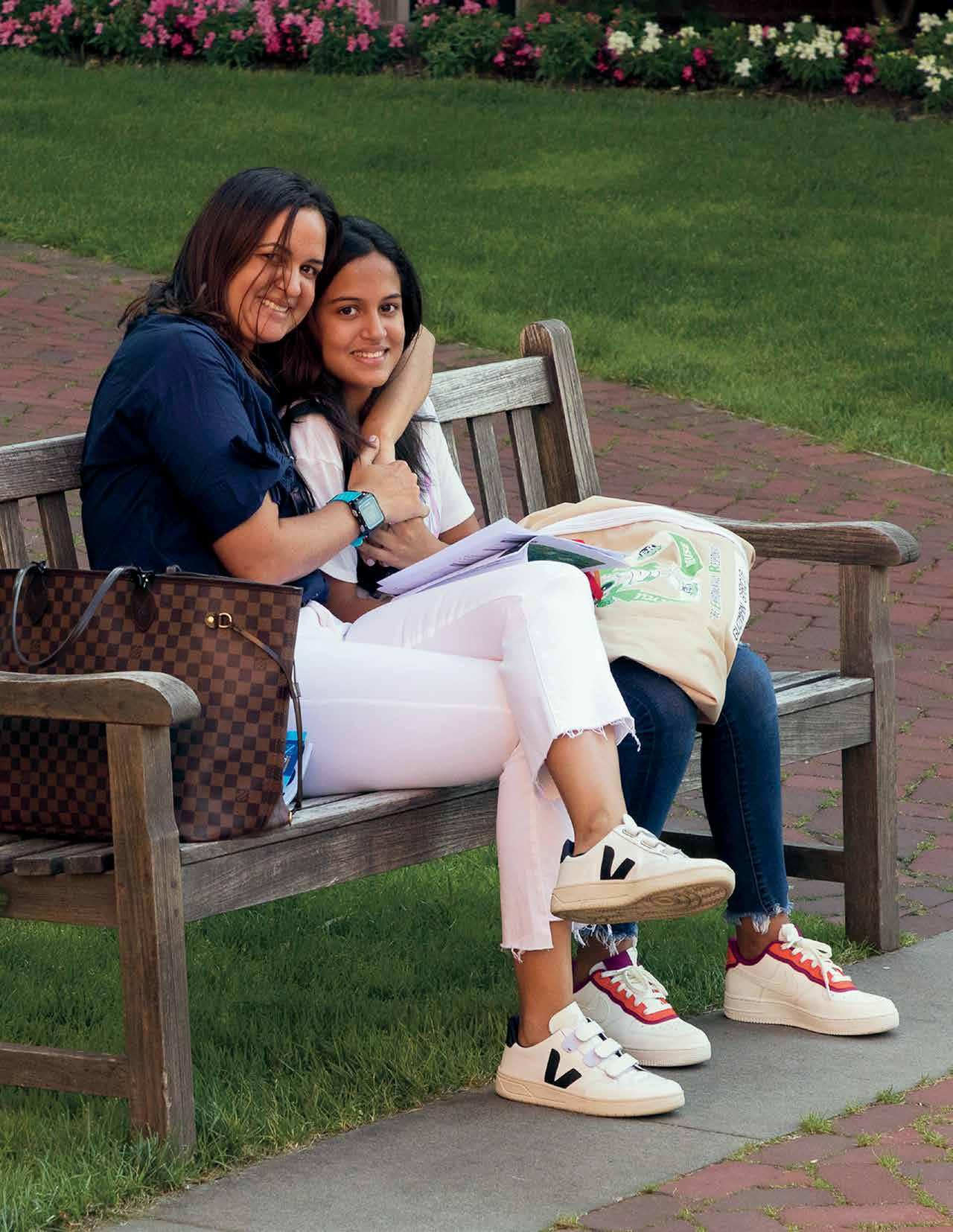
Thank you for everything. My son enjoyed Summer at Taft so much. He has been talking nonstop about the friends he made, his classes, and especially about how awesome his teachers were.
WHAT NEED TO KNOW & LIBERAL STUDIES
parents
R TUITION AND FEES
Boarding Students: $10,500
This all-inclusive fee covers tuition, room and board, textbooks and lab fees, and all school-wide trips and activities, including weekend excursions.
An optional spending account can be set up which can be accessed by making purchases or cash withdrawals at Taft's school store. This is optional as our bookstore and snack machines accept credit cards and ApplePay.
International students are also required to deposit an additional amount to be determined for mandatory health insurance coverage.
Financial Aid: Limited need-based assistance is available to full-time U.S. students. The deadline to apply for financial assistance is April 1. Application forms are available at www.taftschool.org/summer.
Full-Time Day Students: $5,500
This fee covers tuition, lunch, sports, textbooks and lab fees, as well as extracurricular activities and school trips Monday through Friday from 8 a.m. until 4:30 p.m. Weekend trips are not included in this amount. Based on space availability and other factors to consider, participation may be possible, but only with special permission from a director (additional charges may apply).
Financial Aid: Limited financial aid is available to full-time day students. The scholarship application deadline is April 1, and the application form and instructions are available at www.taftschool.org/summer. Priority is given to deserving applicants who can demonstrate financial need.
Application Fee
A nonrefundable application fee of $175 is due with each application. $100 of deposit will be applied to tuition.
Application Deadline for Regular Admission
Rolling.
Tuition Due Date
Within two weeks of official notification of acceptance to the program, a nonrefundable deposit of $1,000 is required to hold a student’s place in the program. The remainder of the tuition is due by June 1st.
Payment Methods
Summer@Taft accepts checks, credit cards, and wire transfers.
R ARRIVAL AND DEPARTURE
Boarding students should arrive the morning of Saturday, June 27 and will depart by noon on Friday, July 31. Families will receive more specific details after registration. Day students will begin classes on Monday morning, June 29. Note: School provided transportation is not included in tuition. Private transportation to and from school is required for move-in and departure.
Immigration: Due to the nature of our summer program, an I-20 form and an F1 student visa are not required. Visitors to the Taft summer session may enter the U.S. in visa waiver or B-2 status (depending on the country of origin). A letter, detailing the purpose for the visit to the U.S., will be emailed to the student after enrollment in the program. If you have questions regarding your immigration status, please contact your local U.S. Consulate or Embassy.
R CONDUCT
Experience has shown us that students who are sincerely interested in making the most of their summer experience do not find it difficult to follow the rules of the School.
Students are expected to meet certain clearly defined standards of behavior as outlined in detail in the student handbook. Matters such as personal integrity, academic honesty, the use of alcohol, drugs, or tobacco (including vaping), and the fulfilling of all school responsibilities, are designed to protect the rights and, most importantly, the safety of the individual and to promote the smooth operation of the community as a whole. Smoking or vaping on campus, in Watertown, or on school trips is strictly prohibited.
The Directors of Summer@Taft and the Dean of Students reserve the right to dismiss any students who cannot abide by the rules of the School or whose conduct is considered harmful to themselves or to the school community.

Writer’s
LAB
DAILY SCHEDULE
R 7:00–8:00 Breakfast
R 8:00–8:30 Meetings
R 8:30–9:15 Class
R 9:30–10:00 Community Time
R 10:00–10:45 Class
R 11:00–11:45 Class
R 12:00–1:00 Lunch
R 1:00–1:45 Class
R 2:00–2:45 FLEX
R 3:00–4:30 Afternoon Athletics
R 5:00–6:00 Dinner
R 6:00–7:30 Free Time
R 7:30–9:00 Study Hall
R 9:00–9:45 Dorm Bonding
R 10:30 Lights
PROGRAM DESCRIPTION
This two-week workshop affords intensive writing opportunities for high school students who are interested in rich and engaging experiences. The primary goal of this course provides students a chance to explore different modes of writing such as analytical, narrative, and creative. Through selfexploration and examinations of texts, students dive into the writing process and use discussion and reflection to shape their writing. Our faculty will work closely with students and provide hands-on instruction. Students will confer with peers and teachers as a means to polish their portfolios.
Formal and informal discussions are a staple of the course; students are charged with critically analyzing the text and incorporating newfound understandings into their own writing. Students will practice making arguments and supporting their ideas with textual evidence while they also review and practice various grammar rules, including composing clear and complete sentences, using appropriate punctuation, and coordinating subject, antecedent, and verb agreement.
Students leave this course with a more nuanced understanding of both analytical and creative writing techniques, rhetorical devices, and correct grammar as well as greater confidence in reading, thinking, and speaking critically about literature. At the conclusion of the session, students will create a final portfolio of their work, and parents will receive a report on the student’s progress.
ENTERING GRADES 9 TO 11 (U.S. Residents only)
July 13–24, 2026
R WHO SHOULD APPLY?
Good writing skills are essential for college and any professional career. The two-week residential Writer’s Lab provides an immersive experience for high school students seeking to write more clearly and effectively.
R HOW DOES IT WORK?
Participants engage in four blocks of subject related classroom activities and FLEX (social emotional strengthening, organization, and time management) each weekday. Class size is limited to 12 students per section. In addition, they take part in a daily athletic program, as well as a variety of cultural, recreational, extracurricular offerings. Meals and housing are provided on campus. Typically, students are assigned one roommate of the same age and gender.
R ON THE WEEKEND
Students will participate in an off-campus extracurricular trip on Saturday. Sunday is reserved for relaxing with friends on campus, at the athletic center, or for visiting local stores and restaurants and a nearby mall.
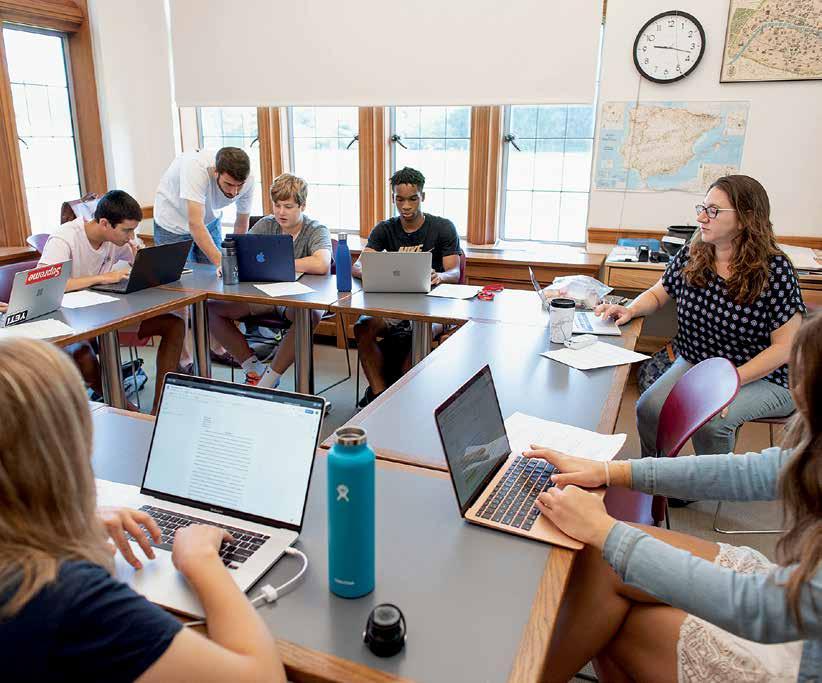
WHAT PARENTS NEED TO KNOW
R BOARDING TUITION AND FEES
$5,500
This amount is all-inclusive and covers tuition, books, room and board, and schoolwide trips and activities.
Note: Financial aid is not available for this program.
An optional spending account can be set up which can be accessed by making purchases or cash withdrawals at Taft's school store. This is optional as our bookstore and snack machines accept credit cards and ApplePay.
Application Fee
A nonrefundable application fee of $175 is due with each application. $100 of this fee will be applied to tuition upon acceptance.
Application Deadline Rolling admission.
Tuition Due Date
Within two weeks of official notification of acceptance to the program, a nonrefundable deposit of $500.00 is required to hold the applicant’s space. The remainder of the tuition is due by June 1.
Payment Methods
Summer@Taft accepts checks, credit cards, and wire transfers.
R ARRIVAL AND DEPARTURE
Registration and move-in takes place the morning of Monday, July 13. Departure for all students enrolled in this program is Friday, July 24.
A suggested packing list and health and permission forms will be supplied in late spring via email.
Note: School-provided airport transfers are not available with this program. Private transportation to and from school is required for move-in and departure.
R CONDUCT
Experience has shown us that students who are sincerely interested in making the most of their summer experience do not find it difficult to follow the rules of the School.
Students are expected to meet certain clearly defined standards of behavior as outlined in detail in the student handbook. Matters such as personal integrity, academic honesty, the use of alcohol, drugs, or tobacco (including vaping), and the fulfilling of all school responsibilities, are designed to protect the rights and, most importantly, the safety of the individual and to promote the smooth operation of the community as a whole. Smoking or vaping on campus, in Watertown, or on school trips is strictly prohibited. The Director of Summer@Taft and the Dean of Students reserve the right to dismiss any students who cannot abide by the rules of the School or whose conduct is considered harmful to themselves or to the school community.
YOUNG
Writer’s
ENRICHMENT INSTITUTE
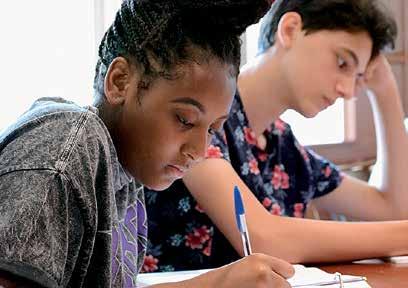
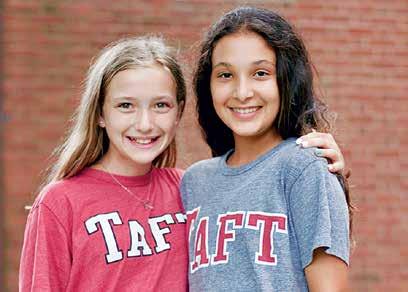
PROGRAM DESCRIPTION
The WRITING element of the course emphasizes the development of analytical and expository composition. Diving into essential grammatical principles, the course reviews sentence structure and syntax, with particular attention given to circumventing the most common grammatical errors. The program places special attention on developing students’ ability to think and write critically about a myriad of perspectives that affect the world around us. We take an in-depth look at the writing process: generating authentic topics, building effective outlines, and learning how to revise drafts.
During the READING portion, teachers foster skills such as reading fluency, comprehension, and expanding students’ vocabulary. Seminar-style class discussions examine selected stories, emphasizing an empathetic and informed approach to literature. Students will write concise, detailed paragraphs that address overarching thematic concepts in their readings and reinforce their analytical skills. Our goal is to encourage our students to develop critical thinking skills that will benefit them throughout their academic careers.
The goal of the STUDY SKILLS component is to boost students’ academic performance by teaching effective time management, organizational, and study habits. Students learn how to set goals, make choices, and establish priorities. The course focuses on different styles of learning, methods for planning out their workload, and effectively using library resources.
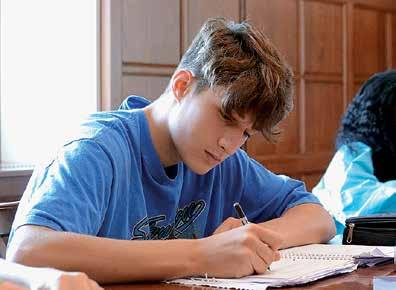
R WHO SHOULD APPLY?
This program aims to elevate students with academic potential to the next level. Students who can benefit from more individualized attention from versatile educators are encouraged to apply.
R HOW DOES IT WORK?
Participants engage in four blocks of subject related classroom activities and FLEX (social emotional strengthening, organization, and time management) each weekday. Class size is limited to 12 students per section. In addition, they take part in a daily athletic program, as well as a variety of cultural, recreational, and extracurricular offerings, both on and off campus. Meals and housing are provided on campus. Each student is typically assigned one roommate of the same age and gender.
R ON THE WEEKEND
Students will participate in an off-campus extracurricular trip on Saturday. Sunday is reserved for relaxing with friends on campus, at the athletic center, or by visiting local stores and restaurants and a nearby mall.
ENTERING GRADES 7 AND 8 (U.S. Residents only)
July 13–24, 2026
WHAT PARENTS NEED TO KNOW
R BOARDING TUITION AND FEES
$5,500
This amount is all-inclusive and covers tuition, books, room and board, and school-wide trips and activities.
Note: Financial aid is not available for this program
An optional spending account can be set up which can be accessed by making purchases or cash withdrawals at Taft's school store. This is optional as our bookstore and snack machines accept credit cards and ApplePay.
Application Fee
A nonrefundable application fee of $175 is due with each application. $100 of this fee will be applied to tuition upon acceptance.
Application Deadline Rolling admission.
Tuition Due Date
Within two weeks of official notification of acceptance to the program, a nonrefundable deposit of $500 is required to hold the applicant’s space. The remainder of the tuition is due by June 1.
Payment Methods
Summer@Taft accepts checks, credit cards, and wire transfers.
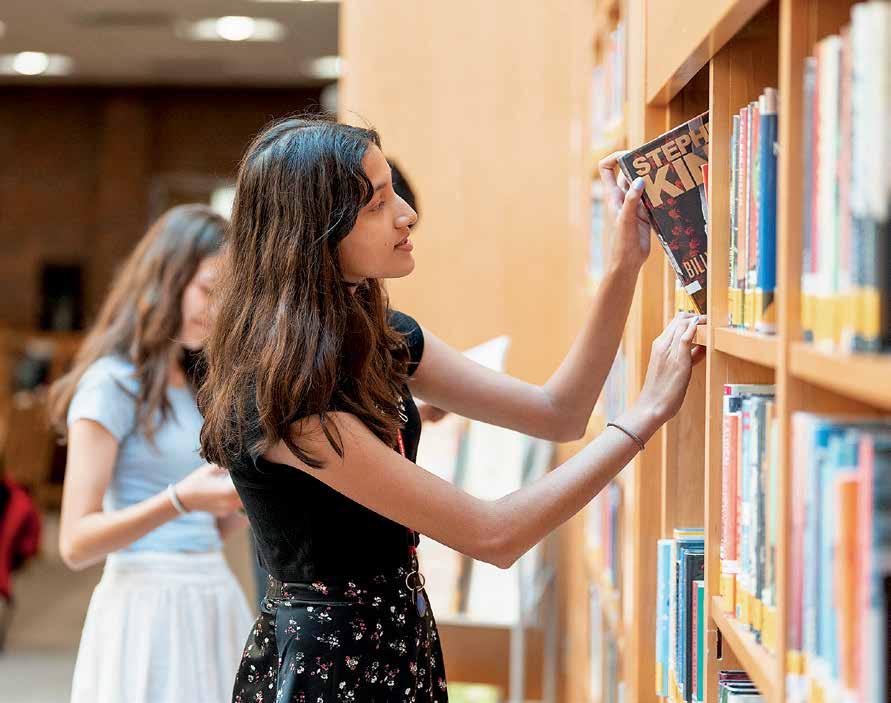
R ARRIVAL AND DEPARTURE
DAILY SCHEDULE
R 7:00–8:00 Breakfast
R 8:00–8:30 Meetings
R 8:30–9:15 Class
R 9:30–10:00 Community Time
R 10:00–10:45 Class
R 11:00–11:45 Class
R 12:00–1:00 Lunch
R 1:00–1:45 Class
R 2:00–2:45 FLEX
R 3:00–4:30 Afternoon Athletics
R 5:00–6:00 Dinner
R 6:00–7:30 Free Time
R 7:30–9:00 Study Hall
R 9:00–9:45 Dorm Bonding
R 10:30 Lights
Registration and move-in takes place the morning of Monday, July 13. Departure for all students enrolled in this program is Friday, July 24.
A suggested packing list and health and permission forms will be supplied in late spring via email.
Note: School-provided airport transfers are not available with this program. Private transportation to and from school is required for move-in and departure.
R CONDUCT
Experience has shown us that students who are sincerely interested in making the most of their summer experience do not find it difficult to follow the rules of the School.
Students are expected to meet certain clearly defined standards of behavior as outlined in detail in the student handbook. Matters such as personal integrity, academic honesty, the use of alcohol, drugs, or tobacco (including vaping), and the fulfilling of all school responsibilities, are designed to protect the rights and, most importantly, the safety of the individual and to promote the smooth operation of the community as a whole. Smoking or vaping on campus, in Watertown, or on school trips is strictly prohibited. The Directors of Summer@Taft and the Dean of Students reserve the right to dismiss any students who cannot abide by the rules of the School or whose conduct is considered harmful to themselves or to the school community.
Algebra
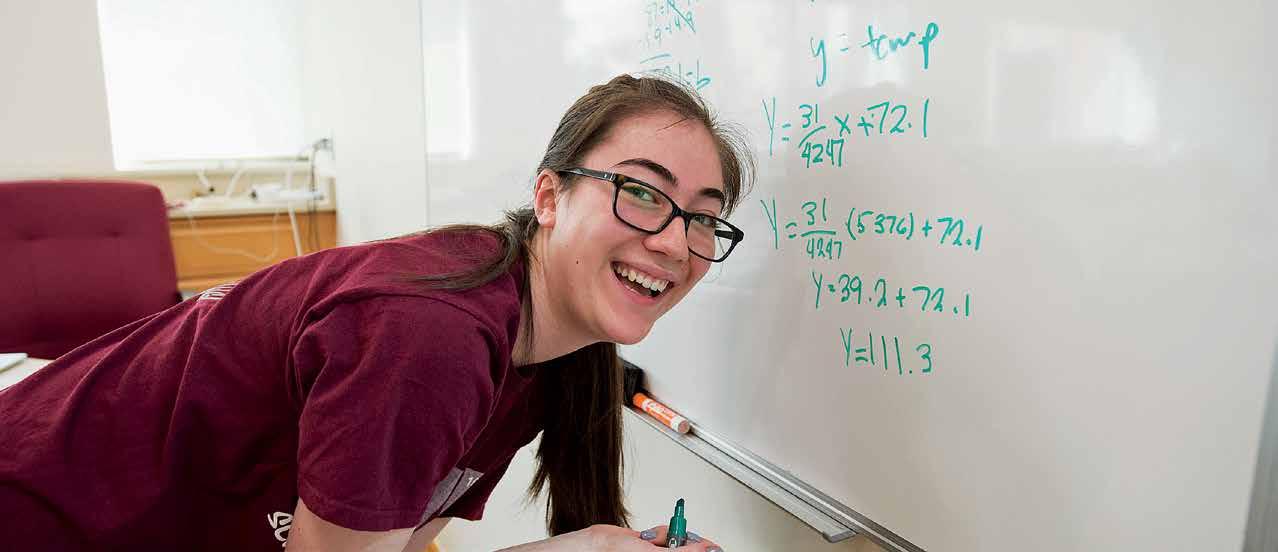
TRAINING WORKSHOP
DAILY SCHEDULE
R 7:00–8:00 Breakfast
R 8:00–8:30 Meetings
R 8:30–9:15
R 9:30–10:00
R 10:00–10:45
R 11:00–11:45
R 12:00–1:00
R 1:00–1:45
R 2:00–2:45 FLEX
R 3:00–4:30 Afternoon Athletics
R 5:00–6:00 Dinner
R 6:00–7:30 Free Time
R 7:30–9:00 Study Hall
R 9:00–9:45 Dorm Bonding
R 10:30 Lights
PROGRAM DESCRIPTION
This two-week intensive focuses on strengthening command of basic mathematical understandings as well as setting a strong foundation for algebraic concepts. The course will reinforce students’ number sense by specifically reviewing numerical techniques, arithmetic, and number systems. Students should possess the ability to process those pre-algebra concepts, but the course seeks to reinforce those rudimentary skills before moving into algebraic concepts.
As the session shifts, the course examines linear equations and word problems, which provide the heart of algebra. The goal is for students to solve quadratic equations both by factoring and formula. Constant repetition and practice will strengthen their problem-solving skills. The instructor will stress critical thinking rather than rote memorization, which will prepare students for future mathematical courses. Students who are beginning algebra will benefit from the intensity of the course. Students will leave the program with more confidence in their mathematical abilities and problem-solving skills.
ENTERING GRADES 8 AND 9 (U.S. Residents only)
July 13–24, 2026
R WHO SHOULD APPLY?
Intended for students entering grades eight and nine, this two-week course focuses on training students in the fundamentals of algebra. Through individualized attention and practice, students will increase their confidence in their mathematical abilities and develop the critical thinking necessary to succeed in high school level math.
R HOW DOES IT WORK?
Participants engage in four blocks of subject related classroom activities and FLEX (social emotional strengthening, organization, and time management) each weekday. Class size is limited to 12 students per section. In addition, they take part in a daily athletic program, as well as a variety of cultural, recreational, extracurricular offerings, both on and off campus. Meals and housing are provided on campus. Typically, students are assigned one roommate of the same age and gender.
R ON THE WEEKEND
Students will participate in an off-campus extracurricular trip on Saturday. Sunday is reserved for relaxing with friends on campus, at the athletic center, or for visiting local stores and restaurants and a nearby mall.

WHAT PARENTS NEED TO KNOW
R
BOARDING
TUITION AND FEES
$5,500
This amount is all-inclusive and covers tuition, books, room and board, and schoolwide trips and activities.
Note: Financial aid is not available for this program.
An optional spending account can be set up which can be accessed by making purchases or cash withdrawals at Taft's school store. This is optional as our bookstore and snack machines accept credit cards and ApplePay.
Application Fee
A nonrefundable application fee of
$175 is due with each application. $100 of this fee will be applied to tuition upon acceptance.
Application Deadline Rolling admission.
Tuition Due
Date
Within two weeks of official notification of acceptance to the program, a nonrefundable deposit of $500.00 is required to hold the applicant’s space. The remainder of the tuition is due by June 1.
Payment Methods
Summer@Taft accepts checks, credit cards, and wire transfers.
R ARRIVAL AND DEPARTURE
Registration and move-in takes place the morning of Monday, July 13. Departure for all students enrolled in this program is Friday, July 24.
A suggested packing list and health and permission forms will be supplied in late spring via email.
Note: School-provided airport transfers are not available with this program. Private transportation to and from school is required for move-in and departure.
R CONDUCT
Experience has shown us that students who are sincerely interested in making the most of their summer experience do not find it difficult to follow the rules of the School.
Students are expected to meet certain clearly defined standards of behavior as outlined in detail in the student handbook. Matters such as personal integrity, academic honesty, the use of alcohol, drugs, or tobacco (including vaping), and the fulfilling of all school responsibilities, are designed to protect the rights and, most importantly, the safety of the individual and to promote the smooth operation of the community as a whole. Smoking or vaping on campus, in Watertown, or on school trips is strictly prohibited. The Directors of Summer@Taft and the Dean of Students reserve the right to dismiss any students who cannot abide by the rules of the School or whose conduct is considered harmful to themselves or to the school community.
THE JIG
Our student union (or as we call it at Taft, “The Jig”) is equipped with a pool table and ping-pong tables, a large television with music selection capabilities, a multi-zone sound system and comfortable furniture where students can relax and spend time with friends.
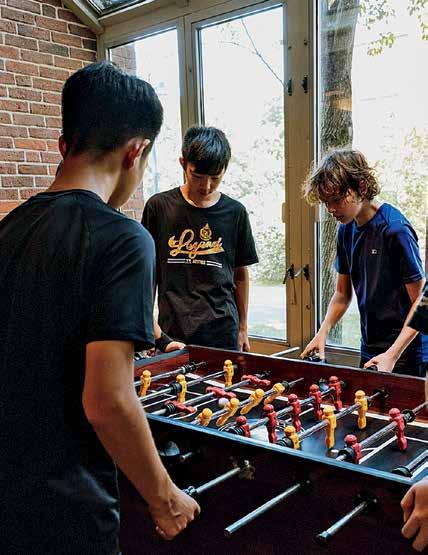
Summer LIFE TAFT

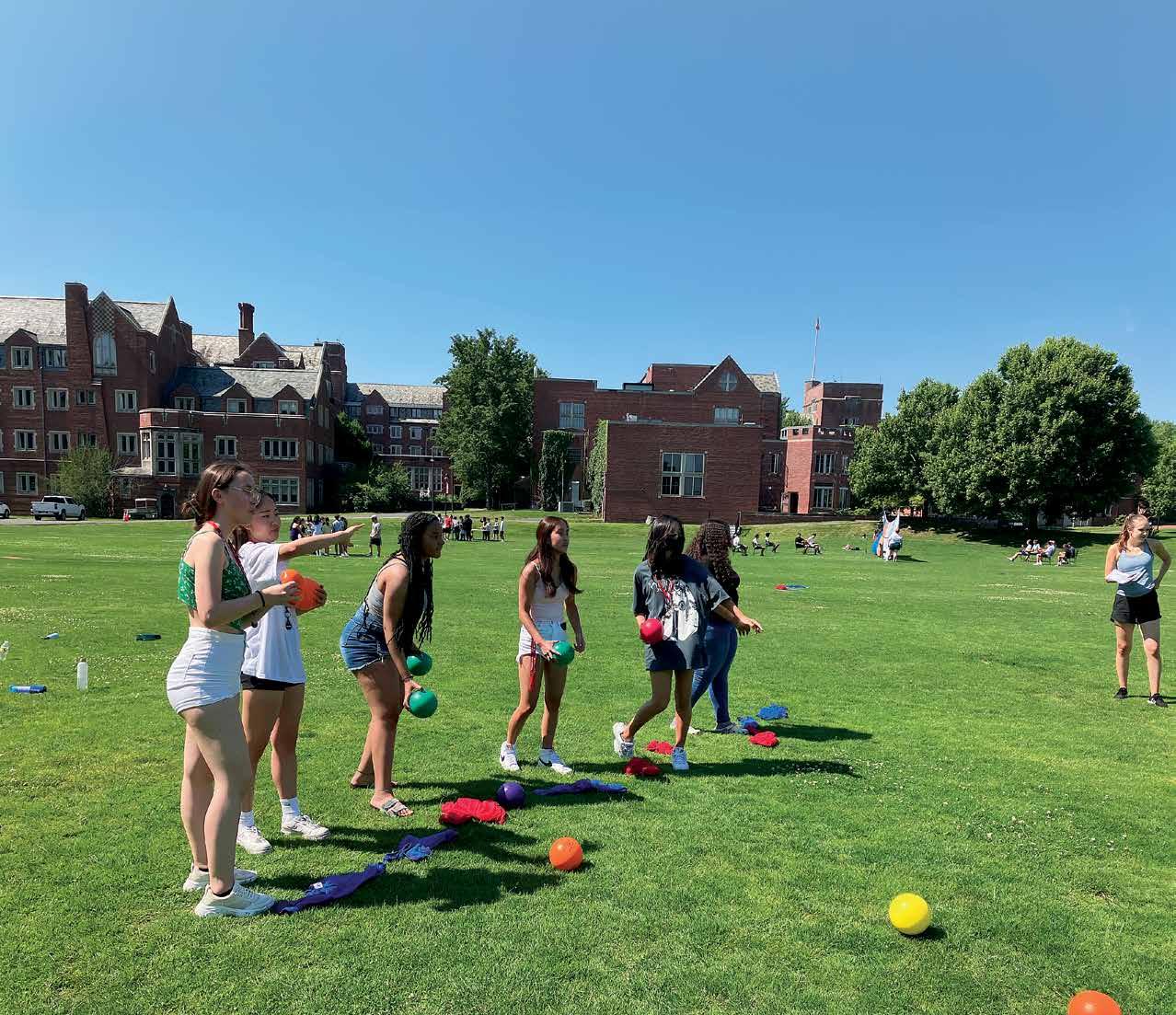
Everyday and everything has been my favorite memory at Taft.
MEET GABRIEL
HOMETOWN: Cumming, Georgia
PASSION: I am young and still trying to discover my passion, and the summer program definitely helped point me in the right direction.
GOALS FOR THE SUMMER: To enjoy the experience, have fun, and enhance my learning to prepare for high school.
FIRST IMPRESSION: I thought the campus was beautiful, and it was way larger than I imagined.
FAVORITE CLASS: My favorite class was definitely computer science, which was taught by Mr. Leong.
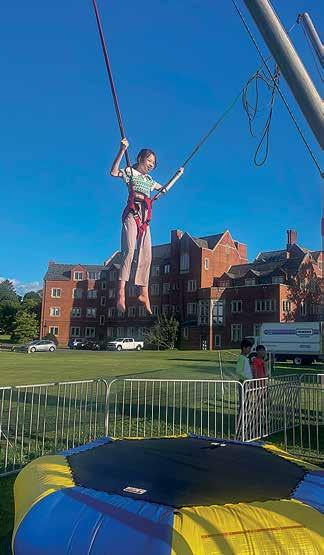
FAVORITE SPORT: Squash, which was coached by the teaching fellows. It was a sport that I never tried before, so it was a new and fun experience.
FAVORITE FOOD IN THE DINING HALL: Definitely the ice cream!
FAVORITE MEMORY: The final dance because I got to hang out with all of the friends I made during the program.
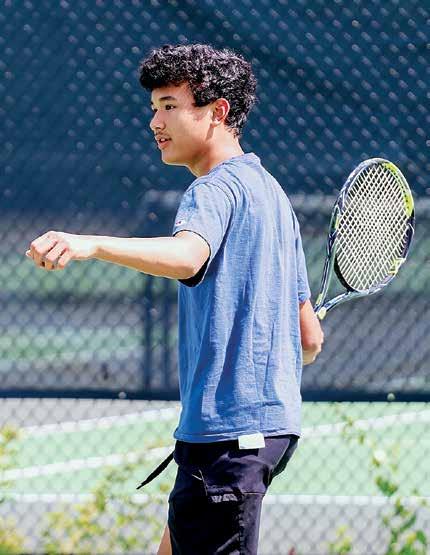
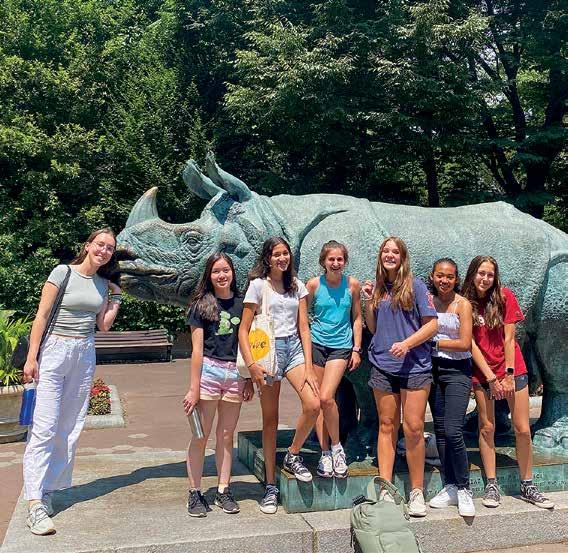

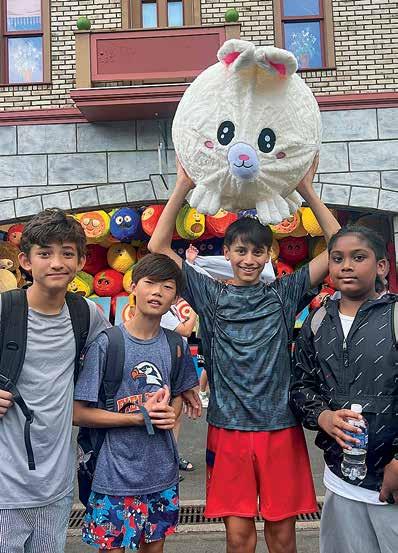
I had an absolute blast this summer! Along with becoming more confident in who I am and becoming more responsible, I am proud of overcoming the challenges of leaving my family and traveling to Connecticut alone. The things I learned will stay with me forever, and the friendships I made will last for a lifetime.
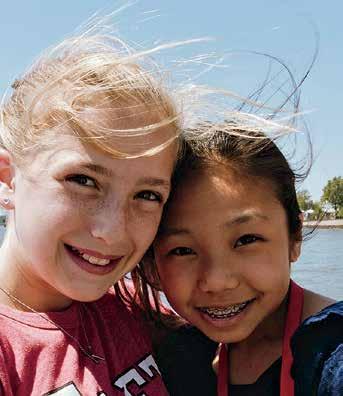
MEET KAITLYN
HOMETOWN: Ridgefield, CT
PASSION: Making friends and listening to music.
GOALS FOR THE SUMMER:
To make new friends and have a fun and educational summer.
FIRST IMPRESSION:
The campus. I saw it from a distance at first and I loved it! The buildings are gorgeous inside and out, and the fields are wonderful.
FAVORITE FOOD IN THE DINING HALL: The cookies and the baked ziti. The vanilla and the M&M cookies were so delicious!
FAVORITE CLASS:
STEM because we worked on so many fun projects, and the best part was that the students got to choose what we wanted to do.
FAVORITE SPORT:
Dance with Ms. Brennan and Ms. Petruzzi because the choreography and every activity that we did was so much fun. I always looked forward to going!
FAVORITE MEMORY:
Almost every bit of the final week. I had so much fun with my roommate, the formal dance was fun, and the "Celebration of the Arts" was a blast.
Q&A
Q Are the dorms co-ed?
Can I have a single if I want one?
The dorms are not co-ed. As one of the goals of our program is to mirror a traditional boarding school experience, boarding students should expect to have a roommate.
Jack: “I really appreciate the great room you chose for me! It helped me study in a quiet place and prepare for my first year at boarding school in the fall.”
Q Can I walk into town whenever I want? You can walk downtown anytime during free time as long as you’re back in time for study hall and have signed out with the Summer@Taft office.
“My favorite memory is of walking into town with my friends, getting our nails done, going to Dimitri’s and then grabbing dessert in town.”
Q
Can I change classes?
Yes, provided that space is available, Young Scholars and Liberal Studies participants may change courses during the first few days of the program. Final course assignment in math is determined by a placement test.
QCan I watch TV when I finish my homework: We allow students to watch TV before and after study hall, but not during. Televisions are located in the common rooms on each floor and in the student union. The large projection screen in Bingham Auditorium is used for special occasions (like World Cup soccer).
Q Are there set times I have to do my homework? On school nights, the entire residential community has study hall between 7:30–9:00. Minori: “My advisor, Ms. Gudas, treated me to Talenti Gelato after study hall. She even remembered my favorite flavor, Vanilla Bean!”
My favorite memory was the talks in the dorm with my friends.
Q What about technology?
The campus is wireless and laptops and cell phones (to be used during free time only) are encouraged.
Q Can I prepare for the SSAT or SAT during Summer@Taft? Yes. We offer online classes for our summer students to prepare for these important tests. You can enroll in a prep classes at an additional charge and partipate four evenings a week while you are here.
Q Do you accommodate vegetarians? Simple vegetarian options are provided at each meal. Each dorm has refrigerators where you may keep snacks, and vending machines are also available. In addition, local food establishments deliver to Taft.
Q Can my parents visit? Absolutely! We have an open door policy, but to avoid a scheduling conflict, we appreciate a phone call in advance of the visit.
Q Do I have to make my bed? Yes. Dorm faculty inspect rooms regularly. You’re expected to make your bed, pick up your belongings, and empty your trash and recycle bins.
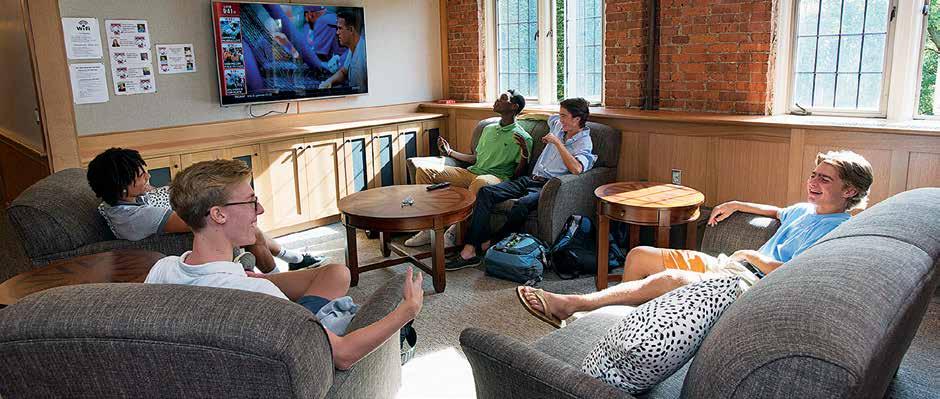
I loved so many things such as the black box meetings, trips, especially to the amusement parks, and hanging out with my friends on campus.
Q How many kids live on each floor? On average, about 20 to 30 kids of the same age live on each floor, supervised by dorm faculty. The faculty live in the dorms and are a great resource in the event of any personal, social, or academic issues.
Q Who chooses my roommate? We will make every attempt to find a great fit. Reaching outside your comfort zone and making new friends is one of the most exciting aspects of spending your summer at Taft!
Q Do I have to participate in a sport? Yes. Athletics and intramurals will meet in the afternoon portion of the program. You'll have an opportunity to choose different activities. Typical options include soccer, basketball, volleyball, weight training, tennis, squash, Frisbee, yoga, and use of the fitness room. Matteo: “The soccer field was one of my favorite places to make new friends.”
Q How can I continue to practice music? Although we do not offer any music lessons, practice rooms are available to you for use during free time.
Q Can I go home on weekends?
Most students will remain on campus on the weekends to take advantage of the busy social calendar and day trips being offered. If you choose to go home, you can depart on Friday after sports and return by 7 p.m. on Sunday evening.
Trina: “I finally conquered my fear of roller coasters!”
Q What about my laundry?
You can use a credit card to operate our washers and dryers available in each dorm, or sign up with a laundry service at an additional cost.
Q Is there a dress code?
The dress code at Summer@Taft is informal, with shorts and t-shirts being the norm. Frayed and patched clothing, as well as facial or body piercings are not permitted. Plan to bring one nice outfit for the more formal functions.
Q What is FLEX?
All Summer@Taft students will participate in a course focused on social and emotional well-being. This class also teaches skills and strategies to set you up for success in the classroom and beyond.
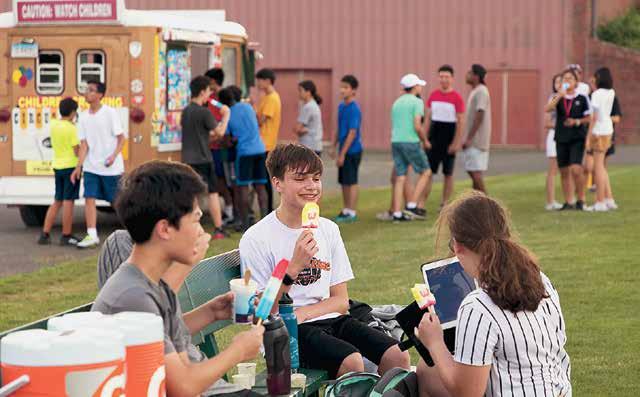
QHow big are the classes?
Your classes will be very small, generally consisting of 10 students or fewer. The faculty/student ratio at Summer@Taft is 5:1.
“My classes were engaging because of the content and how small they were. They felt more intimate, thus giving everyone a chance to share their ideas and hear what others had to say. In Lit & Comp class, our book discussions made it feel more like a fun book club with friends.”
Q What is the difference between the 2-week and the 5-week programs?
The two-week program is ideal for students whose primary goal is to focus intensely on one topic. Two-week programs are open to U.S. residents only.
The focus of the five-week program is on independent school or college preparation, including reviewing or previewing challenging course material, test preparation, and gaining independence, confidence, and self-reliance.
Arrival and departure require private transportation for both programs.
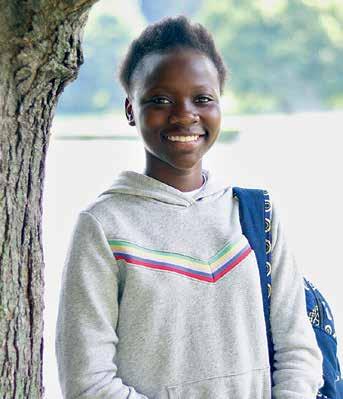


I have got a bunch of friends from all around the world!!! I am still an English learner, so I was glad when I could talk to everyone in English in classes and events.
Six Flags is also one of my favorite memories, probably in the top three days all summer!”

WHERE WILL YOU SPEND YOUR WEEKENDS?
Tons of exciting activities, including day trips and on-campus activities are offered each weekend. Around town, there are several small stores and restaurants located within walking distance of campus.
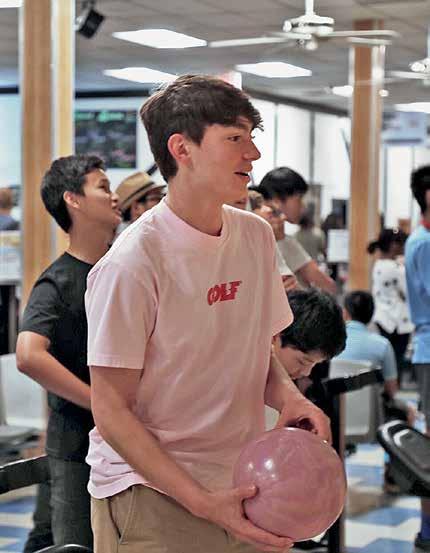
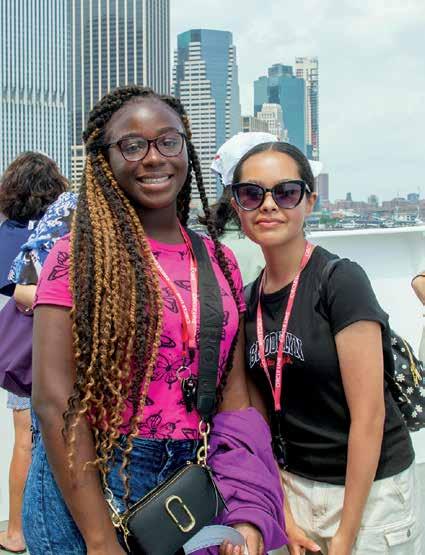

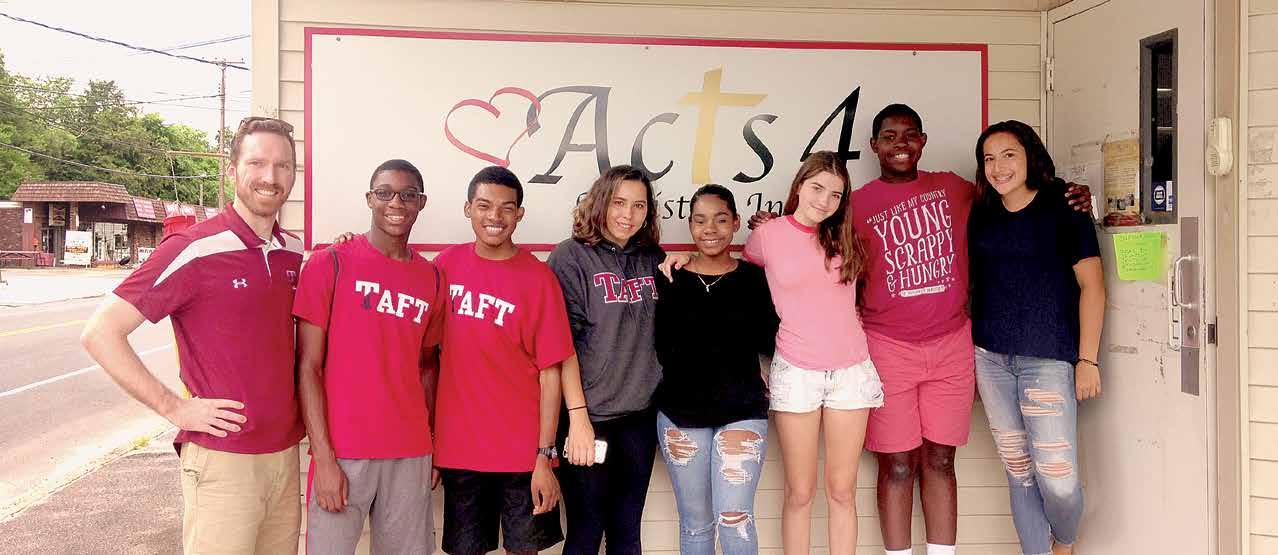
COMMUNITY NOT TO BE SERVED BUT TO SERVE
Non ut sibi ministretur sed ut ministret
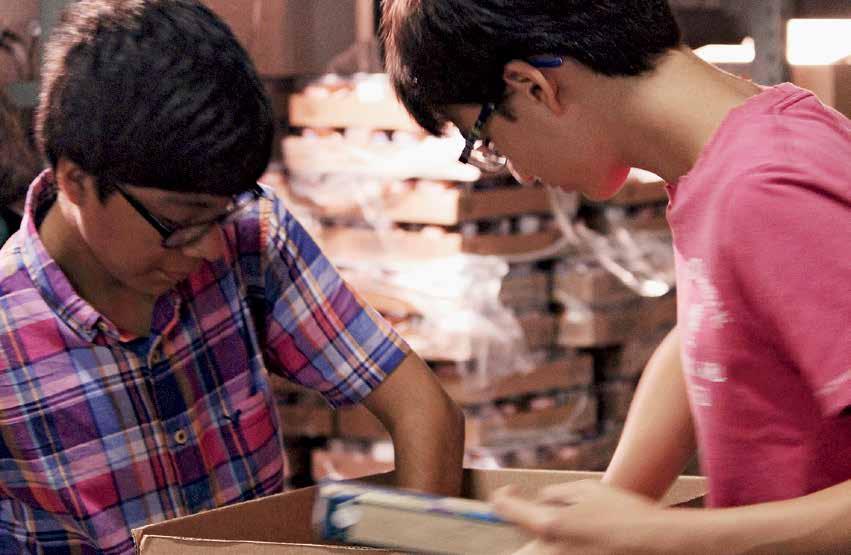
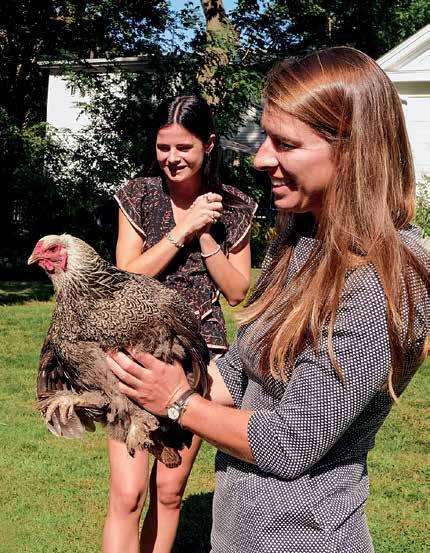
Because Taft’s buildings are all situated close together, you really will live where you learn. The layout of the school building is designed so that students, faculty, and staff inevitably interact with one another multiple times every day.
About 90 percent of our students live in the three dorms used during the summer. Dorm faculty and interns quickly become more than just teachers and chaperones; they become mentors and role models.
Day students won’t miss out on the fun, though. They are always welcome to participate in on-campus social activities or take advantage of extra help being offered during study hall.
The atmosphere on the corridors is relaxed, but structured study halls in the evening and constant faculty presence in the dormitories are recognized as essential to developing an environment conducive to learning.
Dorm rooms come equipped with basic furnishings; a list of additional items to bring is supplied several weeks prior to arrival. Common rooms are located on each floor in the dorms and come equipped with sofas, a television, and a refrigerator.
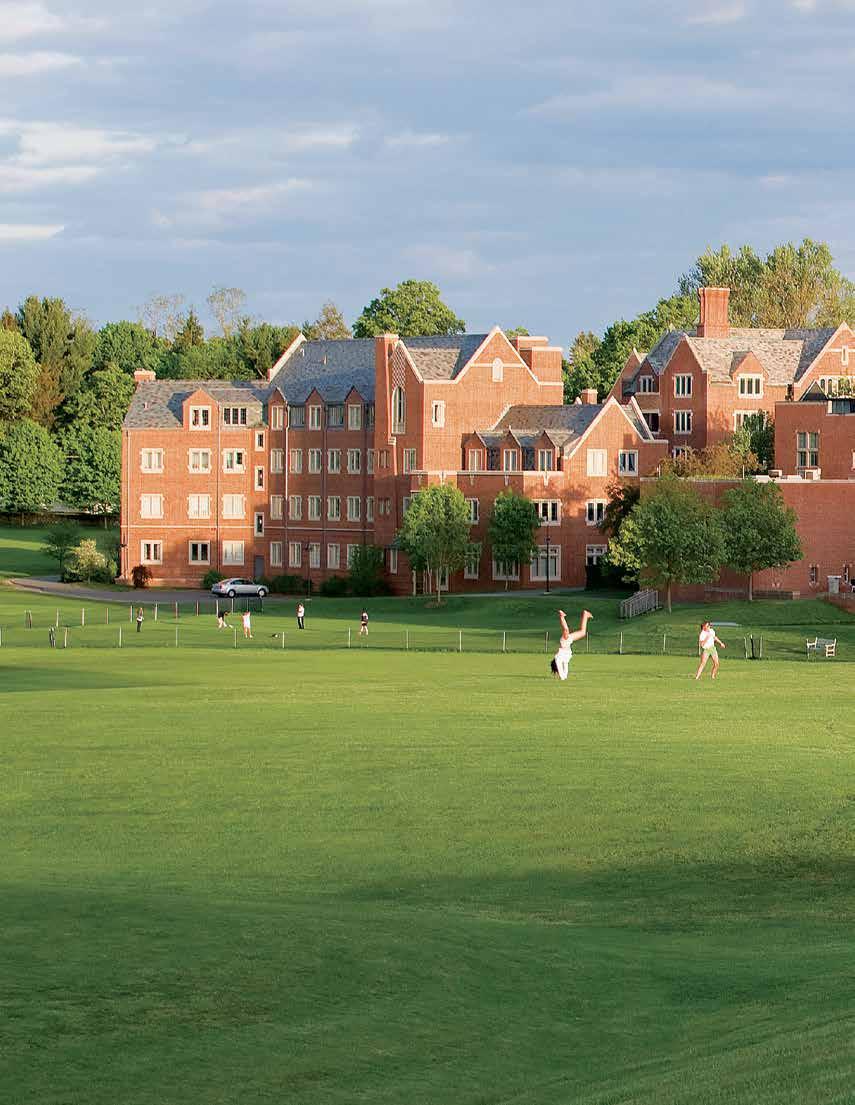

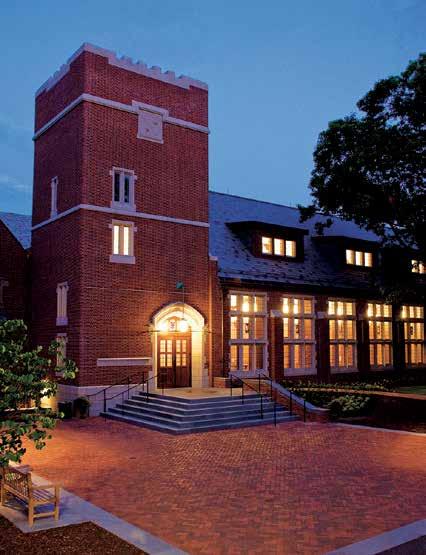
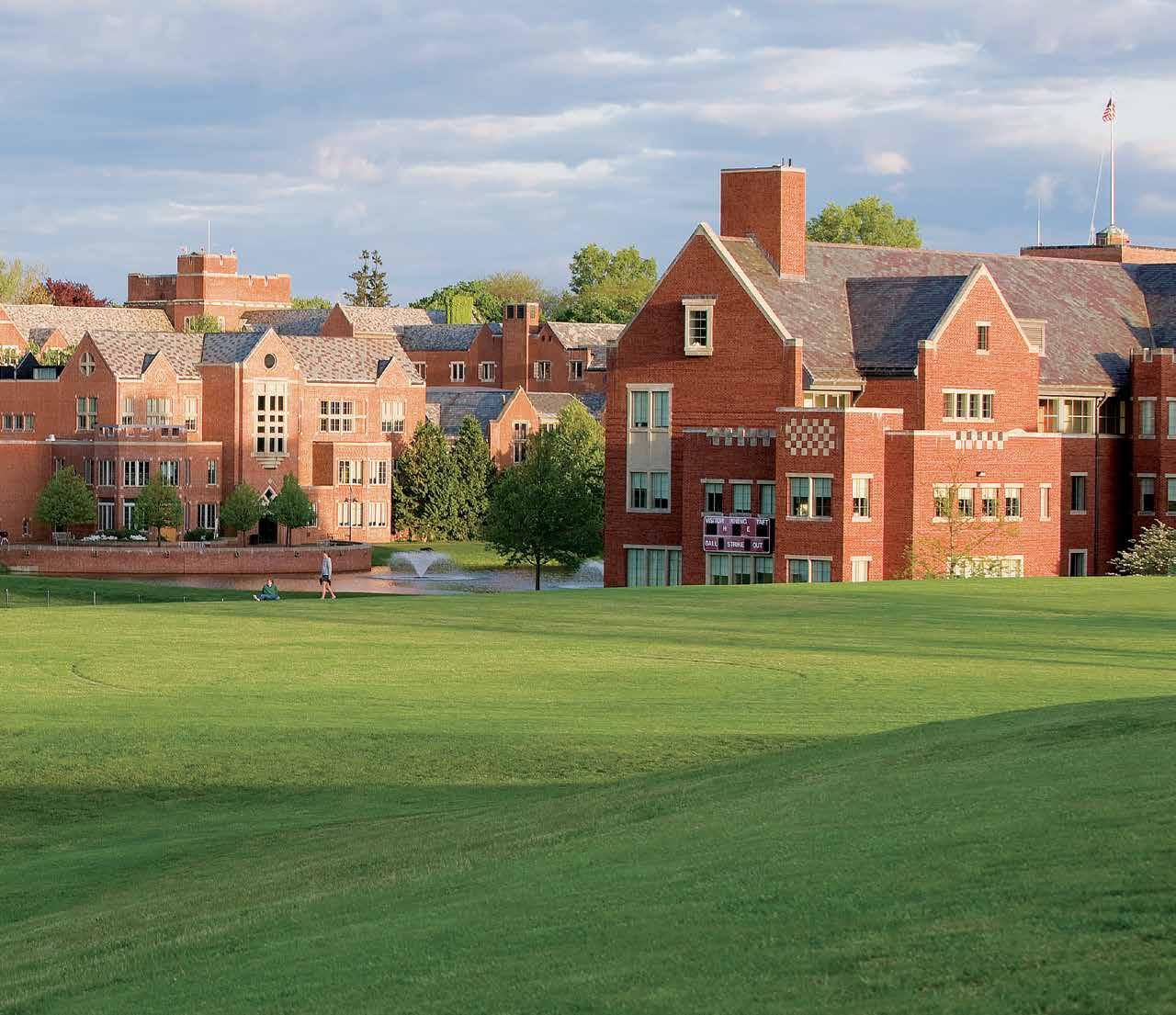
WILL YOU BE LIVING AND LEARNING?
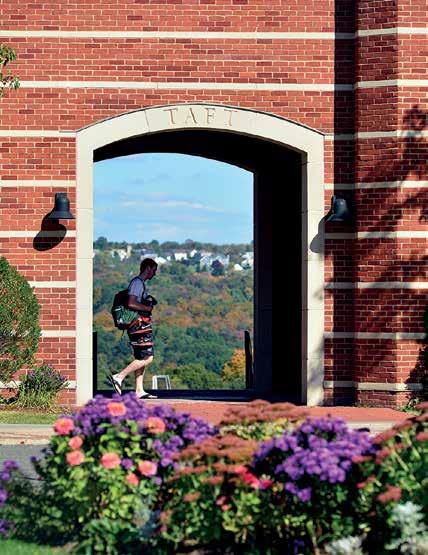
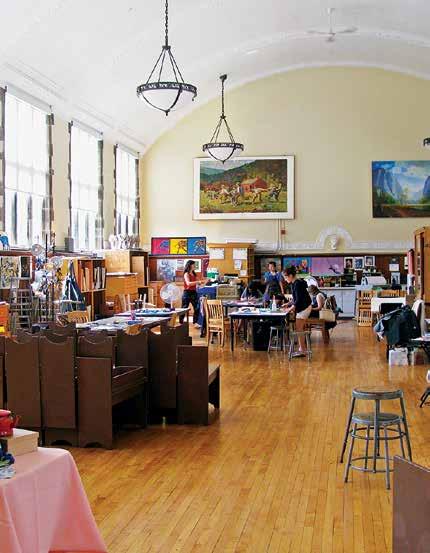


ACADEMIC FACILITIES
R Arts and Humanities Center
R Digital Design Computer Lab
R Hulbert Taft Jr. Library
R Lady Ivy Kwok Wu Science and Mathematics Center
R Laube Auditorium
R Moorhead Academic Center
R Mortara Family Academic Wing
R Nancy and Ben Belcher Learning Center
R Pinto Family Language Lab
R Woolworth Faculty Room
R Wu Computer Lab
ARTS FACILITIES
R Bingham Auditorium
R Choral Room
R Electronic Music Studio
R Gail Wynne Studio
R Mark W. Potter ’48 Art Gallery
R Music Practice Rooms
R Pailey Dance Studio
R Photography Dark Rooms
R Tremaine Art Studio
R Walker Hall
R Woodward Black Box Theater
RESIDENTIAL HALLS
R Centennial Dormitory
R Charles Phelps Taft Hall
R Congdon House
R Cruikshank House
R Horace D. Taft Hall
R John L. Vogelstein ’52 Dormitory
R McIntosh House
R Upper School Girls Dormitory
DINING & STUDENT LIFE
R Centennial Quadrangle
R East Dining Hall
R Laube Dining Hall
R Lincoln Lobby
R Oscarson Jigger Shop & Patio/Student Union
R Moorhead Wing
R Potter's Pond
R Prentice Dining Hall
R School Store
R Woodward Chapel
THE LADY IVY KWOK WU SCIENCE AND MATHEMATICS CENTER
features more than 45,000 square feet of state-of-the-art laboratory and classroom space, along with two networked computer labs. Each laboratory in the science center is equipped with a SMART Board™ interactive whiteboard, enabling teachers to dynamically deliver video, animation, graphics, text and audio from a projected computer. Mobile laptop labs throughout the school enable teachers and students to collect and analyze data, conduct historical research, and participate in writing workshops.
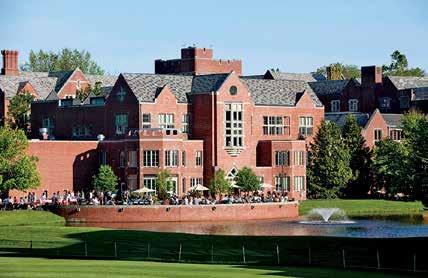
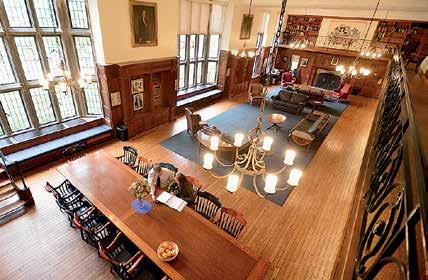
THE NANCY AND BEN BELCHER LEARNING CENTER
includes the Belcher Reading Room and the Hulbert Taft Jr. Library.
The library’s mission is to provide a place where students can work individually and in small groups; where they can browse through open shelves and sample new interests; where teachers can pursue their own research and interests.
The library houses 55,000 volumes and subscribes to a wide array of local, state, national, and international newspapers, as well as more than 150 journals in hard copy. In addition, full-text databases provide access to articles in over 12,000 periodical titles.
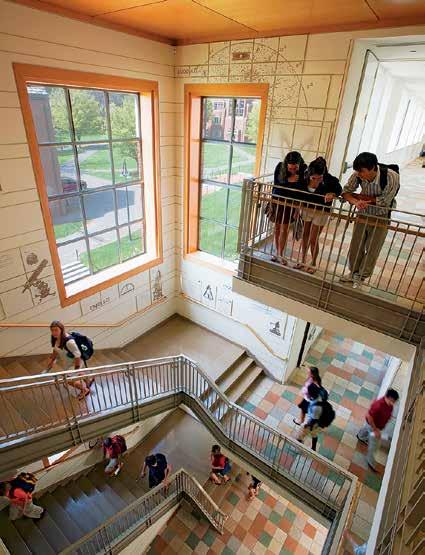
When I first saw the entire school, I immediately thought, ‘I’m going to get lost in here’ and ‘I love this place at the same time.’ I really enjoyed the fun hands on and interactive activities in Mr. Corey’s Physical Science class.”
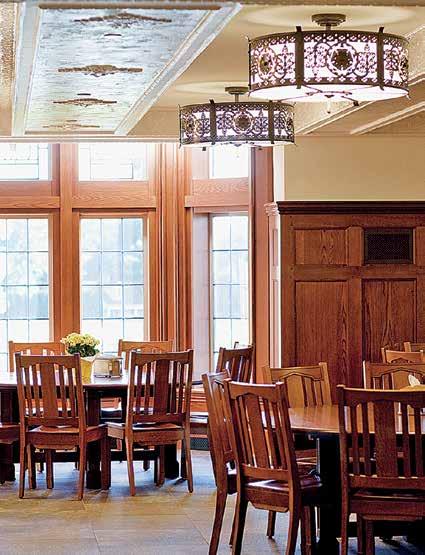

THE PINTO LANGUAGE LEARNING AND RESOURCE CENTER
features a sophisticated combination of computer hardware and software facilitates for learning languages, including interactive work and access to global media.
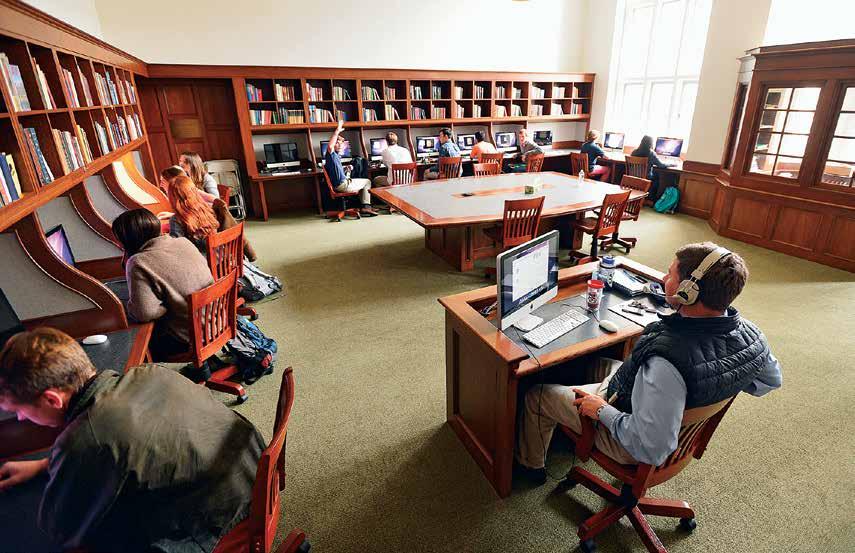
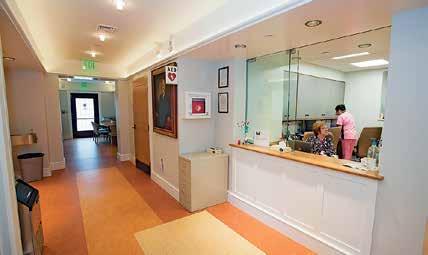
MEDICAL SERVICES
The Martin Health Center is a fully equipped facility with a registered nurse on duty at all times. In addition, a physician is on call throughout the day. Emergency medical service is available at St. Mary’s Hospital, which is a ten-minute drive from campus.
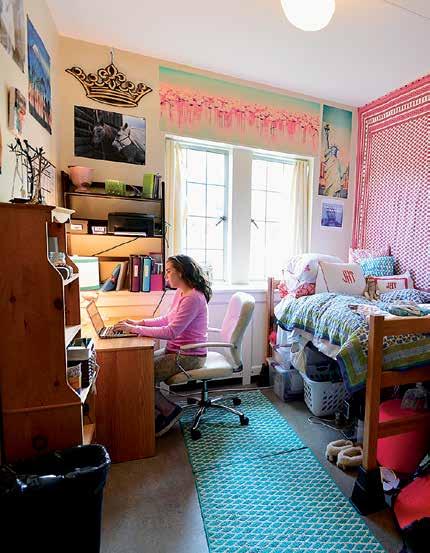
WHO WILL YOU BE LIVING WITH?
MEET NATALIE
HOME COUNTRY: Ukraine
PASSIONS: I am interested in project management and development. I love environmental science and activism. I am exploring dance and theater composition and enjoy playing the guitar.
GOALS FOR THE SUMMER: To get to know Taft a bit better before coming to the Taft School for my sophomore year.
FIRST IMPRESSION: The Taft campus amazed me with its beauty. I was happy to meet a lot of friendly faculty that were ready to help everyone to acclimate and form a close community during the summer.
FAVORITE CLASS: Literature and Composition II with Mr. Tellis.
FAVORITE SPORT: Squash with Mr. Zhang and Mr. C.
FAVORITE FOOD IN THE DINING HALL: Mashed potato and burgers!
FAVORITE MEMORY: The final dance night with all my friends and fellow scholars was the nicest way to finish the summer.
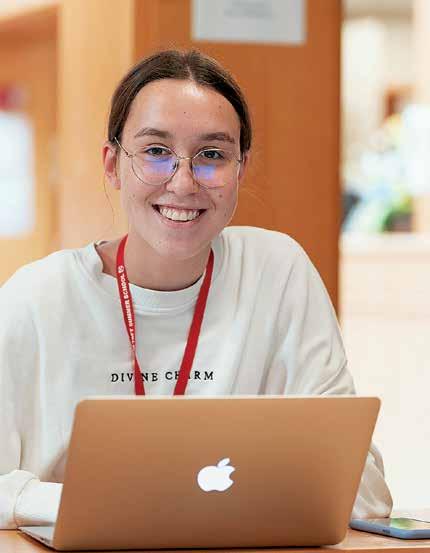
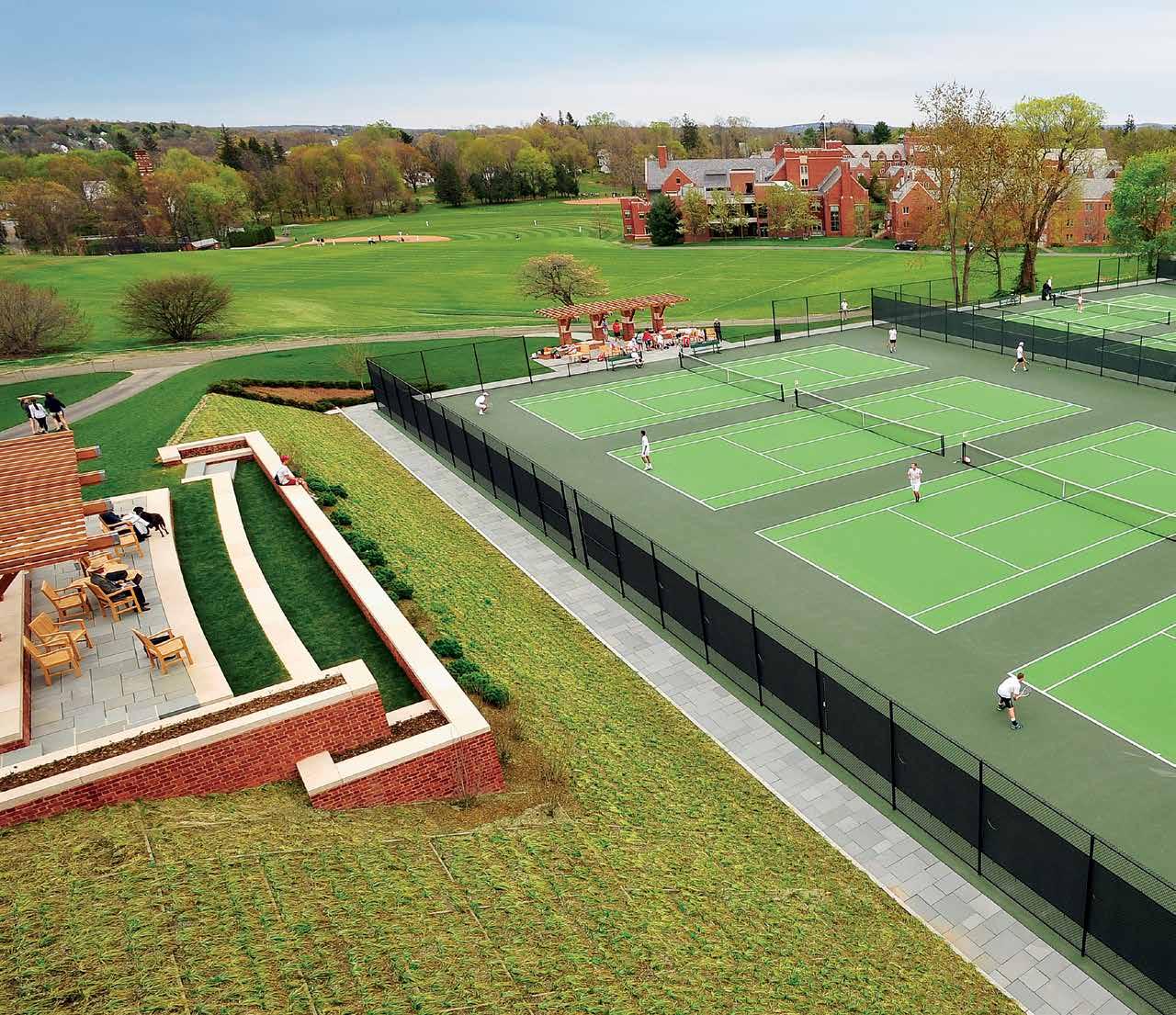
WILL YOU PLAY? What
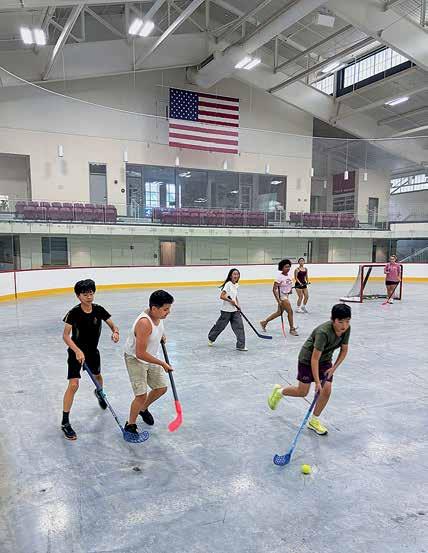
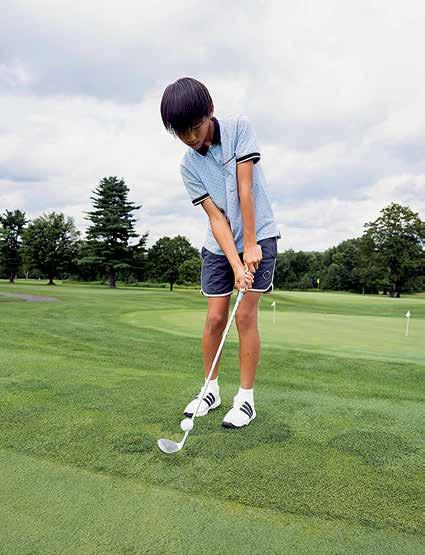
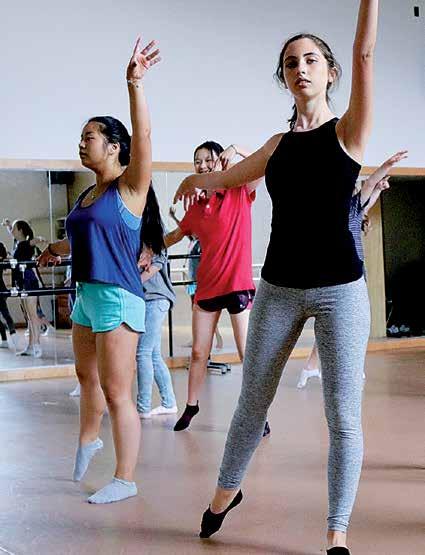
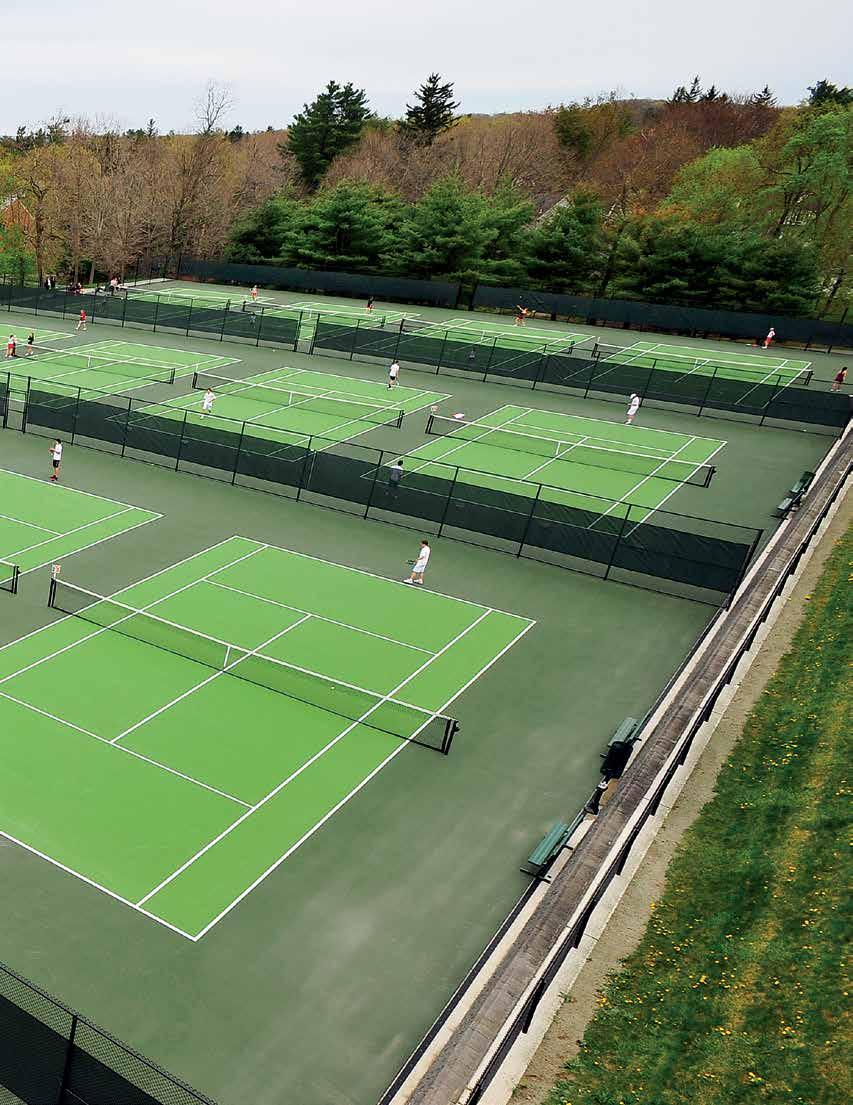
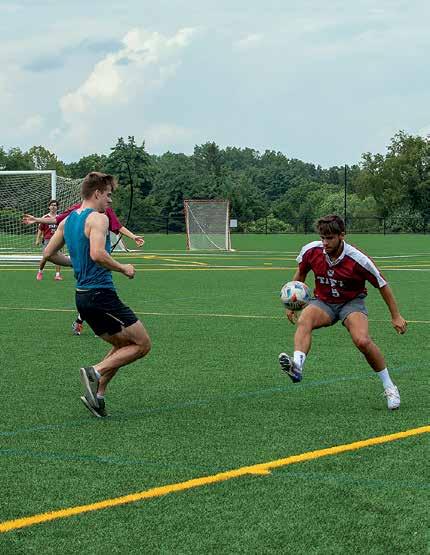
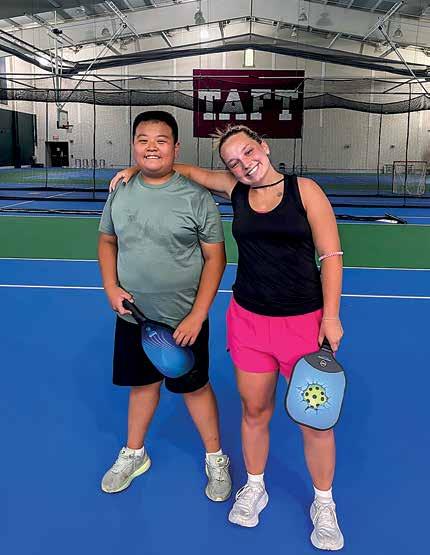
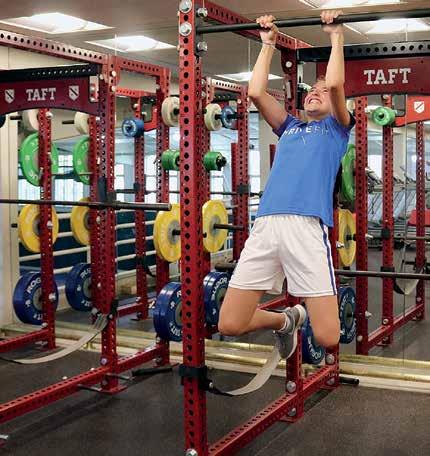
INDOOR SPORTS
R Basketball
R Squash
R Volleyball
R Weight Training
R Fitness
R Yoga
R Dance
OUTDOOR SPORTS
R Soccer
R Volleyball
R Flag Football
R Tennis
R Pickleball
R Running
R Ultimate Frisbee
R Golf

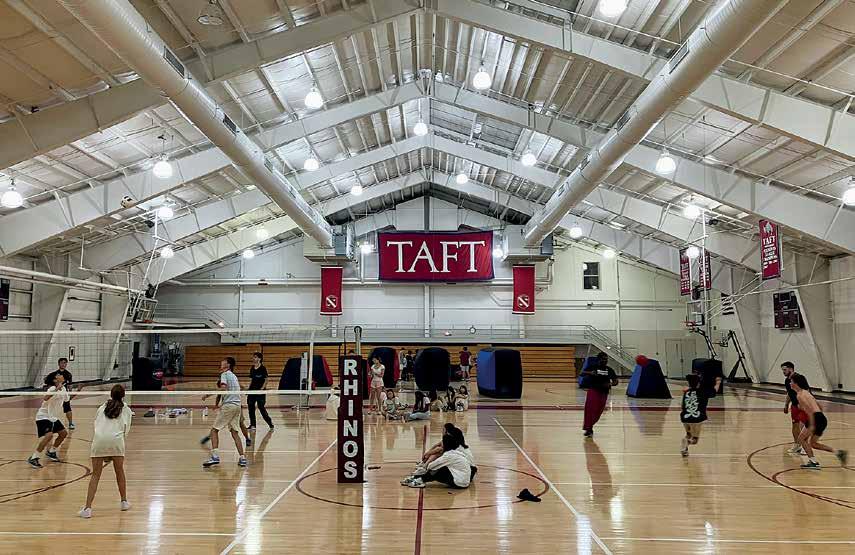

ATHLETIC FACILITIES
R 18-Hole Championship Golf Course
R Cruikshank Athletic Center
R Donaldson Family Pavilion
R Peter Frew ’75 Tennis Courts
R Geoffrey C. Camp ’91 Synthetic Turf Field
R Katie Jackson Morrison ’92 Field
R Lawrence H. Stone Baseball Pavilion at Rockwell Field
R Logan Field House
R Mays Hockey Rink
R McCullough Athletic Center
R Odden Hockey Arena
R Parents’ Association Field House
R Rockefeller Field
R Snyder Field
R William Weaver Track
Although I enjoy basketball and it is one of my main sports, yoga was my favorite because it allowed me to relax and regroup before study hall.

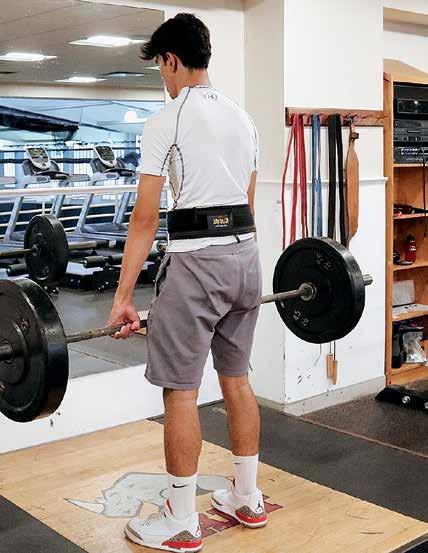
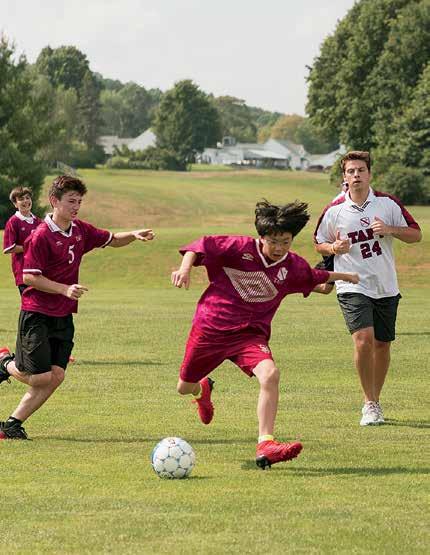
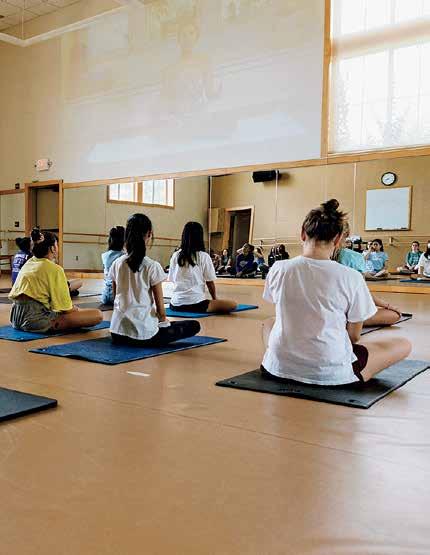

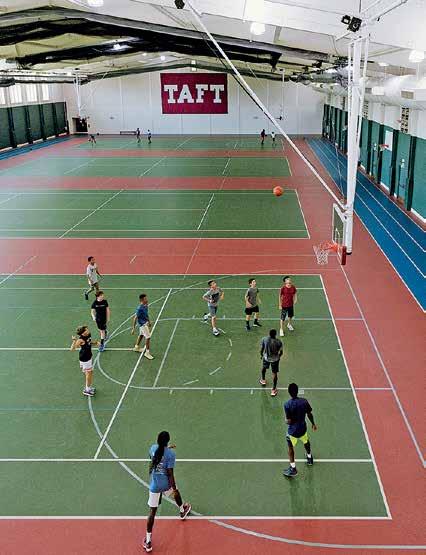
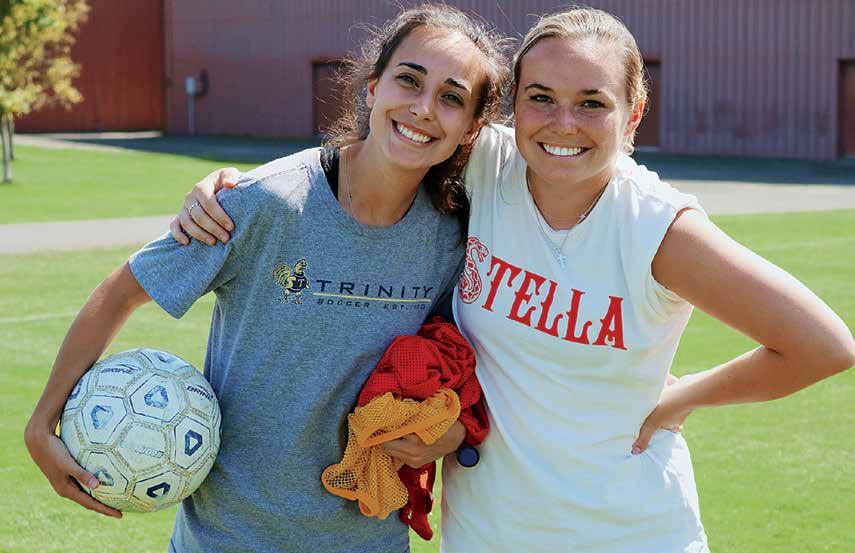
MEET ALLISON KALVAITIS ’18
Sports played a central part in Alli’s life as a student at Taft, where she played varsity softball for all four years, earning accolades as a Western New England All-Star and a Founders League All-Star during her junior and senior year and serving as captain in her senior year. Alli was also a member of the varsity sailing and junior varsity volleyball teams at Taft.
Alli graduated from Taft in 2018 and went on to earn her bachelor’s degree in history at Franklin University Switzerland. While there, she was a member of the honors program, graduated summa cum laude, and worked as a writing tutor and research assistant. She now lives in Washington, D.C., where she is pursuing a master’s degree in international development at American University while teaching at an independent school in Maryland.
Alli returned to Taft in 2022, first as a summer teaching fellow and later as a teacher and coach. In addition to teaching, she helped coach a range of sports, including volleyball and squash, and lived in one of the girls’ dorms as a mentor and advisor. Alli offers, “Coming back to Taft the past two summers has been an incredible opportunity that has solidified my love of teaching, coaching, and mentoring. As an alumna, it has been a pleasure to return to campus and pass on my knowledge and love of Taft on to the summer students. I can’t wait to return!”
CoreACADEMIC CLASSES
R ENGLISH DEPARTMENT
While several courses of varying levels of complexity are offered, the primary goals of the summer English program are to teach students to write and speak clearly and to help them to analyze and understand what they read. Small classes allow teachers to evaluate student writing regularly and thus enable each individual to develop the ability to communicate ideas more effectively.
* International Students: Placement in the appropriate English program may be determined by the score on a placement test or through a writing sample provided by each student on the first day of classes.
110.
LITERATURE AND COMPOSITION I
Intended for middle school students, this course focuses on building fundamental reading and writing skills. Most classes combine a consideration of the principles of clear written expression with the close, critical reading of narrative and dramatic fiction. Seminar-style class discussions stress the critical approach to literature. A review of grammatical principles lays the foundation for studying expression at the
level of the sentence. Concurrently, students learn to write focused, purposefully developed expository paragraphs, and during the last week, they compose a complete essay, including brainstorming to generate ideas, selecting appropriate organizational strategies, outlining, and revising and editing.
Stephen: “Mr. Christoffersen offered great tips and advice and introduced me to Sherlock Holmes. I loved the small classes because it was easy to develop relationships with students and teachers.”
111. LITERATURE AND COMPOSITION II
Designed for rising 9th graders and beyond, this course strives to make students more disciplined, effective writers and more careful, thoughtful readers. Students devote half of their time in and out of class to mastering the skills necessary to write clearly and purposefully; they spend the remainder of their time learning to read and analyze challenging literature.
The writing instruction is designed to enhance students’ command of written expression. They learn to compose grammatically sound, controlled sentences
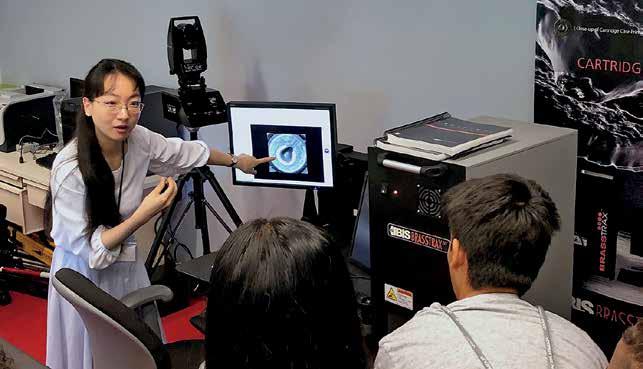
by reviewing the principles of grammar. Concurrently, students are instructed in the fundamentals of paragraph construction, from composing effective topic sentences to developing those topic sentences in a unified and coherent fashion. Finally, as they write papers on specific topics, students are systematically exposed to the various stages of the writing process: brainstorming, organization (outlining and “mapping”), and editing. Throughout the session, students prepare a number of papers—paragraphs at the outset and complete essays in the last two weeks—on topics ranging from personal narratives to literary analysis.
Students become more skilled readers by considering a selection of short stories and a novel. Class discussions, focused on the close reading of specific passages, teach the students to read carefully and critically. This critical approach is complemented by regular short written exercises.
Siyi: “Mr. LaRochelle taught us how to write a super good paragraph and we read a great number of short stories and novels during class. He also taught us how to write a sonnet. I had a great time with him.”
112. CREATIVE WRITING (YOUNG SCHOLARS) 113. CREATIVE WRITING (LIBERAL STUDIES)
Creative Writing provides a variety of opportunities for those students with a special interest in and a flair for writing poems, scenes, and stories— that is, for using language for effect.
The assignments are technical and sequential, designed to develop talents in both writing and editing.
Three major creative pieces are polished to be evaluated by the instructor and the class in group editing sessions.
The instructor also holds individual conferences with each participant to help the student form experiences and observations into patterns of images and dialogue. Particular attention is given to vivid characterization, varieties of narrative techniques, and principles of “affective” writing.
This course is open to any student who is reasonably confident with and interested in writing. It will be offered in two sections; one section for younger students and the other for older students.
Charlotte: “ I loved having the time in Ms. Ogden’s class to flex my creative muscles while simultaneously expanding my writing ability.”

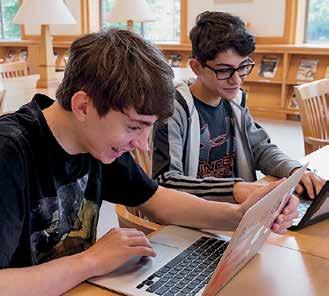
R MATHEMATICS DEPARTMENT
120. PRE-ALGEBRA
The Pre-Algebra course is designed to prepare students for an elementary algebra course by reinforcing the skills necessary for success in secondary school mathematics. In addition to an intensive review, the course previews topics from Algebra I, including operations with numbers and variables, powers and exponents, order of operation and solutions of first degree equations. Other topics will be included as time permits.
121. ALGEBRA I
This course is designed for those who need to strengthen their command of numerical techniques, arithmetic, and number systems before beginning a formal study of algebra. Some of the most important topics from a first course in algebra are also introduced to give the student a firm foundation for later work. Linear equations and word problems are studied to give training in the skills needed for a thorough understanding of algebra.
122. ALGEBRA II
The first half of this course reviews many of the topics of a first course in algebra, including graphing, solution of equations, word problems, fractional expressions, and radicals. The second half of the course expands on these topics and presents some of the new topics of the early chapters of a course in second year algebra. This course is designed to give students greater facility in the skills of algebra by requiring them to work on those techniques which improve with practice.
123. INTRODUCTION TO GEOMETRY
This course prepares students to take a course in geometry by introducing the more important aspects of the studies of shape and logic. Many of the important properties of geometric figures are studied so that they will be better understood when encountered in the more formal structure of Euclidean proof. These topics include symmetry, angle, length, proportion, and parallelism. The fundamentals of logic and proof are presented to give a foundation in the skills of writing proofs.
124. PRECALCULUS
Designed for students who have already completed Geometry and Algebra II, this course affords an opportunity to explore many of the functions important to the continued study of mathematics leading up to the calculus. Topics for study may include, but are not limited to, linear, quadratic, and polynomial functions; rational functions; exponential and logarithmic functions, and trigonometric functions. There will be an emphasis on in-depth study of the selected topics through applications and models. To that end, students enrolled in this course are required to have a graphing calculator. The Mathematics Department at Taft currently uses the TI-84 Plus.
135. INTRODUCTION TO COMPUTER SCIENCE
This course is an introduction to the field of computer science and is geared toward students without prior experience. Because this course is not focused on a particular programming language, students will be exposed to a variety of topics and languages that span the field. Such topics might include web development, graphics, data analysis, and app development using HTML, CSS, Processing, Python, and Swift.
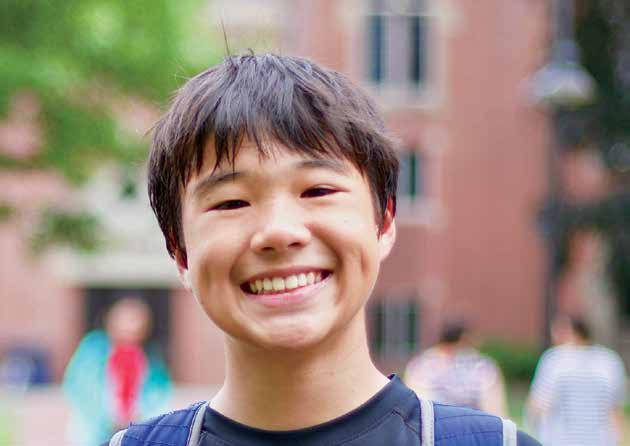
MEET TOFFY
HOMETOWN: Bangkok, Thailand
PASSION: I absolutely love the beauty and elegance of math and how rewarding it feels to solve challenging problems. Currently, I am in the Gifted program in my school; this provides me the opportunity to pursue my interests in algebra and probability by studying the topics at a faster pace and with more depth. Taft has definitely allowed me to pursue this passion, particularly through Algebra II. The course allowed me to see the big picture of how I could harness the power of graphing tools to assist me in solving algebra problems.
GOALS FOR THE SUMMER: To get a glimpse of what boarding school was like. I had a blast at Taft this year from both an academic and social standpoint. The classes were challenging and engaging but there was still time for social interaction and just having fun. I got to play Ultimate Frisbee for the first time and formed bonds with people who have become my good friends.
FIRST IMPRESSION: The warm and welcoming faculty and students. Traveling 9,000 miles across the globe, I did not know what to expect. I was very nervous when I first arrived. But the friendly atmosphere of the school made it much easier to settle in. Everywhere I went, I felt like I was always surrounded by positivity and smiling, supportive people. On top of that, the campus was beautiful and just the right size to create a sense of unity and community throughout the whole school.
FAVORITE CLASS AND TEACHER:
Although I enjoyed all my classes, my favorite was “Introduction to Organic Farming.” Farming has been a subject I have been interested in the last two years, and when I saw the course I knew I had to do it. With Mr. VanHoesen’s expertise, we got to go through the whole farming process firsthand—weeding, preparing beds, fertilization, planting, and harvesting. At the end of the course, we were able to eat the fruits of our labor. Witnessing the culmination of five weeks of work come to fruition was the most rewarding part. Also, watering the plants was so relaxing and serene, a perfect end to a long day.
FAVORITE SPORT AND COACH:
Ultimate Frisbee with Mr. Helgaas. Being a sport most people haven’t played before, we all started on equal ground. Mr. Helgass was very patient, helpful, and insightful to all the struggling players. He would go to players personally and help them perfect their throws. As we improved, the games became more challenging and fun and everyone would eagerly look forward to the next session.
FAVORITE FOOD IN THE DINING HALL: Pizza! A true comfort food.
FAVORITE MEMORY: Going to Six Flags. As a person who loves thrilling activities, I really enjoyed the scary rollercoasters and waterslides.
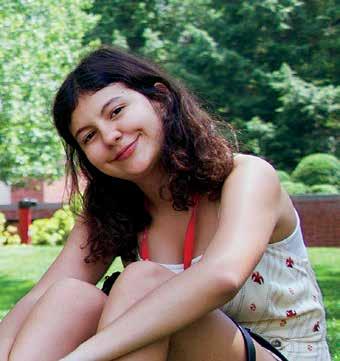
MEET ANTONIA
HOMETOWN: Rio de Janeiro, Brazil
PASSION: Photography and music.
GOALS FOR THE SUMMER:
To meet new people and make friends who live in different countries, speak different languages, and live a completely different life than my own. My other hope was to expand my knowledge and academic skills, and I am very happy that I achieved both of these goals.
FIRST IMPRESSION: That it was going to be an amazing opportunity for me to make new friends. It turned out to be a great way to spend my summer as it helped me become more independent and at the same time, taught me new things.
FAVORITE CLASS: Photography! It’s not only something I am passionate about but it was also my first time printing. The course left me with a deeper understanding and knowledge in the art of photography.
FAVORITE TEACHER:
Ms. Drakeley. She was extremely kind and was always there to help me when I needed it.
FAVORITE SPORT AND COACH: Fitness was my favorite, as it is something I enjoy doing in my free time. Mr. Ball was an extremely funny coach who always challenged us with riddles.
FAVORITE FOOD IN THE DINING HALL: The cookies!
FAVORITE MEMORY: Our super fun trip to Boston. The city is absolutely gorgeous!
Core
ACADEMIC CLASSES (continued)
R SCIENCE DEPARTMENT
130. BIOLOGY
This course is an introduction to the study of modern biology, centering on concepts of evolution, genetics, and cell theory crucial to understanding the development of life and science of biology. This course aims to provide the student with some comprehension of the visible world, with an appreciation of the connections and interrelatedness of all scientific learning. Readings are chosen from a variety of sources; laboratory work, films, and occasional field work are features of the course.
133. CHEMISTRY
This introductory course offers the student the fundamentals of chemistry and an opportunity to analyze modern environmental and biological problems from a chemical perspective. A conceptual understanding of chemistry is taught through lectures, demonstrations, laboratory experiments, and seminar discussions. Students are introduced to the lab reporting process and practice the skills. Readings are chosen from a variety of sources; laboratory work, films, and occasional field work are features of the course. Note: Open to Liberal Studies students only.
134. PHYSICS
This is an introductory course in physics that emphasizes conceptual understanding and laboratory experience. Topics covered will include motion, Newton’s laws of mechanics, energy and momentum, thermodynamics and the description of gases, and, if time permits, electricity and magnetism. While conceptual
understanding is emphasized, students will also be introduced to a precise, quantitative description of nature with a problem solving approach that uses elementary math skills.
137.
STEM
This introductory course is designed to provide students with an overview of major engineering principles and applications, as well as an opportunity to implement those principles through experimentation and designbased projects. The course will take an interdisciplinary approach that draws upon and develops skills from math, science, technology, and art. Students will use technology such as 3D printing.
150. PSYCHOLOGY
This course will cover in depth several major topics in the discipline of psychology. Major emphases will be placed on research methods, the brain and biological bases of behavior, stages of human development, sensation and perception, cognition and consciousness, learning theories, personality theories, and abnormal psychology. Students in this course alternate between learning new material and also applying their knowledge by analyzing case studies, conducting experiments, and completing questionnaires to learn about themselves. This course is designed for high school students and requires advanced reading and critical thinking skills as well as previous experience with biology.
R LANGUAGES DEPARTMENT
141.
SPANISH
This course is designed for a student with little or no experience in Spanish who intends to pursue Spanish at the secondary level. The basic skills of listening, reading, writing and speaking are taught. Students work in the Language Learning Center, a state-of-the-art audio, video, and computer facility.
142. SPANISH II
This course is an intensive review of Spanish offered to students who have completed one or two years of the language, but is flexible in structure and is easily adaptable to the specific needs of those enrolled. The course is designed to improve each student’s ability to read, write, and converse in Spanish. Depending upon the needs of the student, a first- or second-year text is used with a variety of supplementary materials.
143. ENGLISH AS A SECOND LANGUAGE
The ESL Program is designed to provide support for students who need further development in their skills in English reading, writing, speaking, and listening. The program is divided into different levels. An initial placement test determines enrollment in the level most appropriate to each student’s abilities. Writing assignments stress organization and grammar. Students write compositions daily, and they are expected to develop a clear and organized writing style, free of slang and awkward construction. Note-taking skills and techniques are also emphasized. In class, students are required
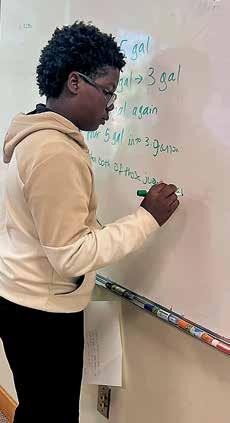
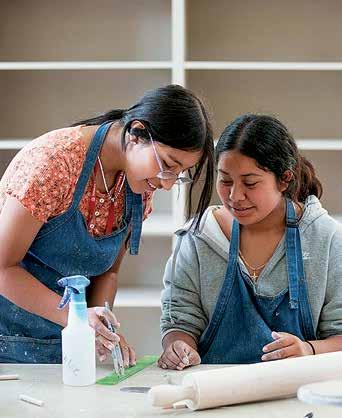
to speak only English. Informal discussions and conversations about a wide range of topics provide important practice for students to develop their verbal language skills.
During the course, students read from a variety of sources, and at each level students read short stories and a novel. Students learn different ways to approach academic reading and have the opportunity to put those skills into practice. In addition to reading on their own, students also spend time reading together in class so that the instructor is able to gauge their understanding and pronunciation. Focus is placed on building vocabulary through the texts and students are expected to apply that vocabulary to creative writing pieces.
Enrollment is the ESL program is limited. Early application and enrollment are advisable.
R SOCIAL SCIENCES DEPARTMENT
151.
EARLY AMERICAN HISTORY
This course examines the colonization of North America and the foundation of the United States. Students will examine the formation of the thirteen colonies, the American Revolution, the creation of the republic and its formative years. Daily reading assignments are given and emphasis is placed on a collaborative examination of material. Students engage in daily discussions but formal debates and other teaching methods are utilized as well. Quizzes and tests are some of the evaluation methods, but an emphasis is placed upon construction of historical persuasive essays.
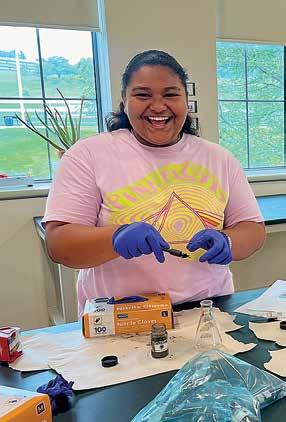
152. 20TH CENTURY
AMERICAN
HISTORY
This course reviews American political, social, and cultural history since the end of World War II. Students will examine specific topics such as the Cold War and the Vietnam War. Students will also develop historians’ skills. Critical reading, evidence-based essay writing, and primary source analysis are emphasized.
153. 20TH CENTURY
AMERICAN HISTORY – ELL
This course is similar in format to 150 but is designed with ELL students in mind.
R ARTS DEPARTMENT
163.
STUDIO ART
This course focuses on exploration in the studio. Students with limited experience are welcome, but should expect to be challenged. Students enrolled in the studio art course assemble portfolios through a series of projects that require creative thinking, problem solving, and attention to aesthetics. Innovative studio art projects concentrate on the elements of art and principles of design through drawing, painting, printmaking, assemblage, installation, and even flipbook animation. There is an emphasis on the development of personal style through the exploration of both traditional and nontraditional media and a variety of subject matter. Art history forms the base of many assignments and students are asked to conduct independent research as well. The course includes instruction in framing and matting in preparation for a gallery exhibit at the end of the term.
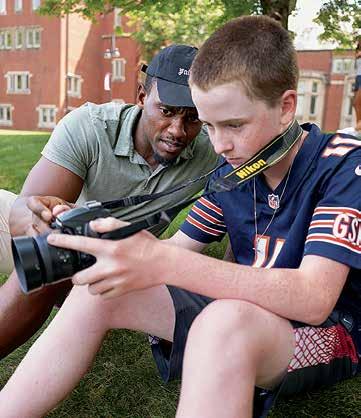
161.
PHOTOGRAPHY
(Traditional and Digital)
This course combines traditional darkroom “wet” practices with the digital “dry” process. Open for enrollment to both beginner and advanced students, this course will address technical and aesthetic aspects of photography. Students will learn to develop black-and-white film and print from negatives. In addition, they will learn the fundamentals of digital image adjustment, including matching the printed output to the image. Picture making values and ideas will be discussed throughout the course. At the end of the summer term, students will have the opportunity to showcase their final product at the student art show. Enrollment is limited to eight participants.
165 AND 166. CLAY WORKSHOP
This course is for the student with no previous experience or for those seeking further development of hand building, throwing, and glazing skills. Many hand-building methods will be explored: slab, coil, dowel,
mold, pinch, trapped air, and the use of textures. Basic throwing, as well as more advanced techniques, will also be taught. Students work at their own pace and experimentation and personal goals will be encouraged. Students will be able to combine throwing and hand building techniques to enhance their ability to build more individualized pieces. Various artists will be introduced to inspire creative thinking. Students will have an opportunity to display their work at a gallery exhibit at the end of the term. The class content is tailored specifically to each age group.
161. PAINTING
This course offers an introduction to the basics–color, composition and design, media, and techniques–and then explores the possibilities of painting. Students work at their own pace, and experimentation and personal goals will be encouraged. Various artists will be introduced to inspire creative thinking. Students will have an opportunity to display their work at a gallery exhibit at the end of the term.
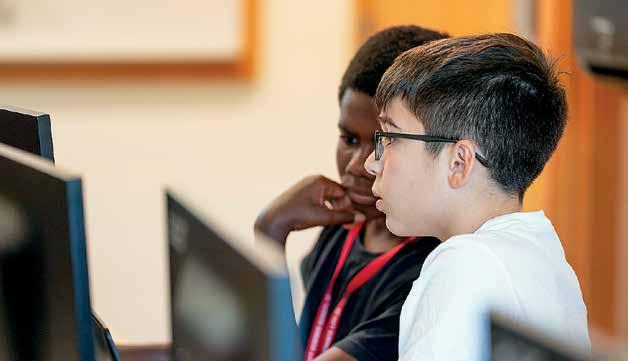
electives
ELECTIVE CLASSES WILL BE CHOSEN UPON ARRIVAL. EXAMPLES OF POTENTIAL OFFERINGS INCLUDE, BUT ARE NOT LIMITED TO:
MEET ATTICUS
HOMETOWN: I consider my hometown to be Shenyang, China, but I currently live in Boston, MA.
PASSION: My passion is skiing. I enjoy the excitement of charging down a gentle slope, the accomplishment of making it down a steep hill without bailing, and the sudden weightlessness of jumping on my skis.
GOALS FOR THE SUMMER:
My goals for the summer program were to make good friends, manage spending, develop academic skills, live independently, and have fun. I wanted to make good friends because friends could help me when I face challenges. I wanted to control my money because it is an important skill as I transition to become a teenager. I wanted to sharpen my academic skills to better prepare me for the 7th grade. Living independently is especially exciting because I would be away from home and living with my friends for the first time. Last, I wanted to have fun because I wanted to have fun, because…why not?

FIRST IMPRESSION: My first impression upon arriving on the Taft campus: buildings with red bricks, the senior brick with my brother’s name on it, and the Jig Patio near the pond. I thought, “OMG, it is so beautiful here at Taft, I gotta try to attend the high school.”
FAVORITE CLASS: Even though Computer Science was a complex subject to me, it was still my favorite. In the summer program, Mr. Leong taught it. I liked the subject because I learned a lot of cool knowledge about the coding language Python. Also, I simply think that sitting behind a computer and typing codes is a cool pose.
FAVORITE SPORT: My favorite sport was tennis coached by Mr. Devon. I liked it because the sport is pretty easy to start.
FAVORITE FOOD IN THE DINING HALL: My favorite food in the dining hall was the fries. I liked the fries because they were so crispy that I felt satisfied eating them even without any dipping sauce.
FAVORITE MEMORY: My favorite memory from my summer at Taft was when I rode the Batman roller coaster during the Six Flags trip. It was my favorite memory because it was my first time riding an insane roller coaster that I had never dared to ride before.
ACTING
This is a course for students interested in beginning acting. Topics covered include movement, voice, characterization, and analysis of text. Further, production aspects of makeup, costume, and scene making are considered. Students will have the opportunity to perform at the Arts Festival at the end of the term.
INTRODUCTION TO DIGITAL PHOTOGRAPHY
This is a fast-paced course designed for students with little experience working behind the digital camera. Across the five-week course, students are taught how to operate digital cameras effectively, edit their work within Adobe Photoshop and other editing software, and how to participate in artistic critiques. Students enrolled in this introductory course will create a personal portfolio and exhibit their work at the end of school art show. A digital camera is required for this course.
PAINTING AND DRAWING
This course is intended for the student who wants to explore both painting and drawing in a more relaxed environment. Students will be able to hone their creative skills by experimenting with multiple

mediums of art. They will use colored pencils, thin pens, and watercolor paints to craft various pieces. Students will also work on sharpening their artistic eye by using reference materials for some projects and will use their imaginations for others.
CONTEMPORARY ENVIRONMENTAL ISSUES
This elective introduces students to the scientific issues of the day. Students will examine issues such as global warming, alternative energy sources, and water management. The course will alternate between exploration and research of current challenges, and debate and discussion of possible solutions. Oral skills, specifically debate or presentations, will be emphasized, as well as researching skills.
FORENSIC SCIENCE
This course introduces students to the principles and practices found in the field of forensic science, which draws from the biological and physical sciences. The course begins by examining the theories and concepts necessary to effectively examine, analyze, and reconstruct a major crime scene. Specifically, the legal issues related to the search and seizure of physical evidence, crime scene documentation techniques, and basic crime

scene reconstruction methods will be studied. Students will also study trace evidence and how it is analyzed, compared, interpreted, and used in criminal investigations. Types of trace evidence to be discussed will include glass, paint, hair, fiber, and fingerprints. Case studies of actual crimes and trials will be discussed to illustrate how the science and techniques may be used in the real world.
ORGANIC FARMING
This course will assist students in understanding the growth and field of agriculture and horticulture. In addition to the class work, students will help with the management of the School’s organic vegetable garden.
JOURNALISM
Journalism provides a variety of opportunities for those students with an interest in constructing and creating news stories. The assignments are designed to develop talents in both writing and editing. The culminating project of a school newspaper will be preceded by a variety of smaller assignments, designed to build confidence and refine technique. The instructor also holds individual conferences with each participant to help the student build clarity of expression. Particular attention is paid to exploring the methods of investigative journalism, including conducting of interviews and research. This course is open to any student who is reasonably confident with and interested in writing. It will be offered in two sections; one section for younger students and the other for older students.
PUBLIC SPEAKING
This course introduces students to the basic techniques of writing and developing persuasive and refined speeches and presenting them with poise, confidence, and clarity. In addition to watching and reading the speeches of others, most of the students’ efforts will be devoted to preparing for and delivering a variety of presentations. Major weekly assignments may include a poem recitation, slide presentation, persuasive speech, extemporaneous speech, and culminating speech on a topic of the student’s choice. In-class activities include reviewing the work of peers, critiquing speeches delivered by public figures, and various exercises to practice proper body language, posture, and volume.
THE RESEARCH PAPER
This course is designed to familiarize students with techniques of research in a modern library. After successful completion of this course, students will be able to select and narrow a research topic; to find and use a variety of resources, including reference materials, books, journals, online databases, and the World Wide Web; and to evaluate information, particularly information found on the Web. They will also learn strategies for searching the Web to find authoritative information. Lessons will cover how to document sources using an appropriate citation style. These skills will not be developed in isolation; rather through interesting historical and current events topics. The skills learned throughout the course will be applied in a final short research paper.

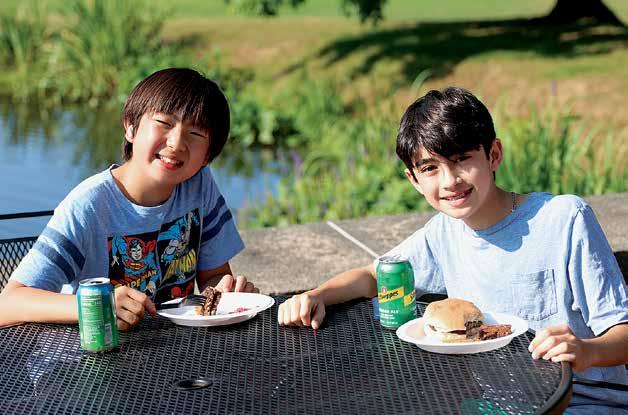
MEET ADAM
HOMETOWN: New York City
PASSION: Baseball
GOALS FOR THE SUMMER:
My primary goal for the summer program was to prepare myself for the upcoming school year. I also wanted to prepare for the SSAT standardized test. But most importantly, I wanted to live the boarding school “experience” first-hand and have fun!
FIRST IMPRESSION: My first impression upon arriving at Taft was a friendly and energetic community with amazing facilities and supportive staff.
FAVORITE CLASS: This is a hard question because I really enjoyed all my classes, and my teachers were amazing. But if I had to go with one favorite, it would be Algebra 1 with Mr. Gemmell. He really made learning fun and brought out the best in us. Also, Mr. Gemmell was my
academic advisor so we really got to know each other outside the classroom, too.
FAVORITE SPORT: Basketball. While there was a ton of games and friendly competition, Coach really pushed us during practice to improve and to be better than when we came in. I also enjoyed squash. I had never played before, and I enjoyed the challenge of pushing myself to try something new.
FAVORITE FOOD IN THE DINING HALL: The desserts! Every day there was something different, and you couldn’t get enough of it.
FAVORITE MEMORY: My favorite memory was going to Six Flags for the first time during one of the weekends. I had so much fun riding on rides and water slides with my friends. I also loved hanging out in the Jig with friends.
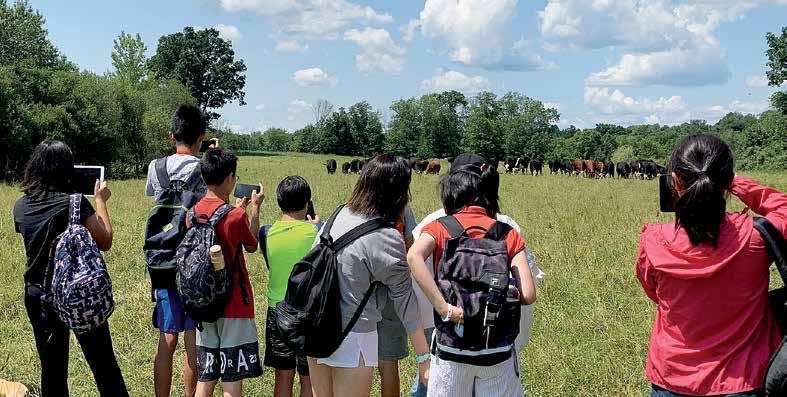
TEST PREP FOR SSAT AND SAT
PROVIDED BY COMPASS EDUCATION GROUP
As the college and private school application process is becoming increasingly competitive, Summer@Taft is pleased to offer a five-week test preparation program for our boarding students and local day students. Taft is partnering with Compass, a national leader in test preparation and academic tutoring for over 30 years.
R Online classes include instruction in both verbal and math.
R Classes are led by test prep experts from Compass: www.compassprep.com/our-tutors
R Practice tests administered under real test-taking conditions.
R Class sizes are kept small, and students enjoy a modern, air-conditioned facility.
R All course materials and practice tests are available in an online portal.
R Parents will receive test results and a report at the conclusion of the program.
R Class times are conveniently scheduled in early evenings on Taft's campus.
R Each SSAT or SAT student must bring his or her laptop to campus for these classes.
Online registration can be found at www.taftschool.org/summer/programs/test-prep-for-day-students. More information about Compass classes can be found at www.compassprep.com/classes/test-prep.


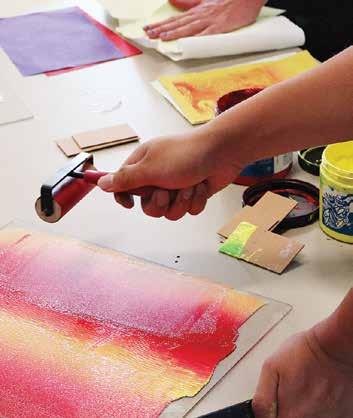


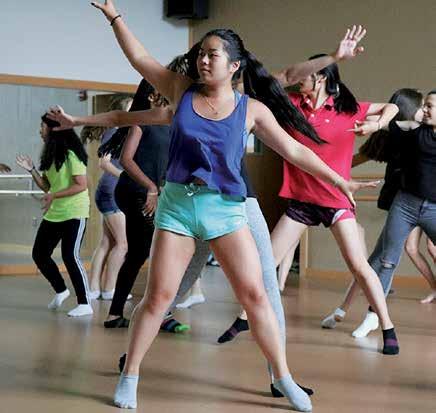
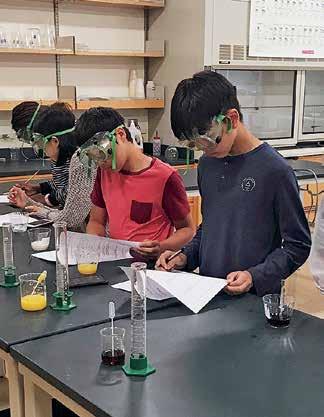
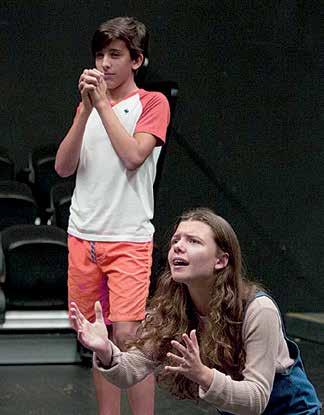
apply HOW TO
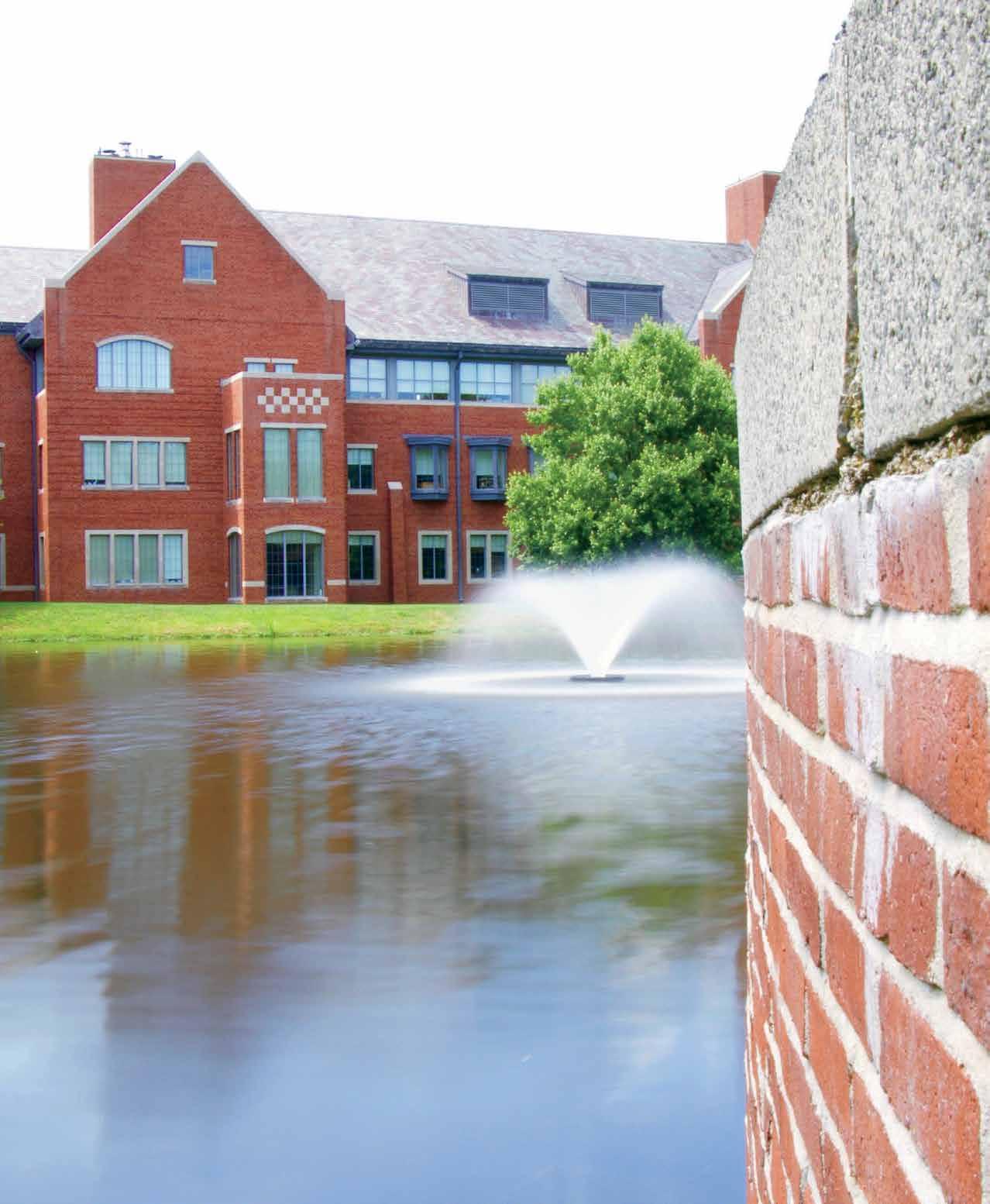
STEPS TO FOLLOW:
1. Fill out application Form A online (taftschool.org/summer/apply/how-to-apply), including your course selections.
2. Next, ask your parents or guardians to check your application and complete the payment information for the $175 nonrefundable application fee ($100 of the application fee will be applied toward the tuition if a student is accepted and enrolls).
3. Submit the School Recommendation Form to your school's guidance counselor or school head by forwarding the link found at www.taftschool.org/summer/apply/ how-to-apply. Ask your school head or guidance counselor to also send a copy of your transcript to us.
4. You are required to have two teachers—one being your English teacher— complete the Teacher Recommendation Form. Please forward the link provided at www.taftschool.org/summer/apply/ how-to-apply to both teachers via email.
5. Contact our office with any questions email: summer@taftschool.org Phone: (860) 945-7967
Note: If you applied to Taft for the 2026–27 academic year, you don’t need to send additional recommendations. Simply send Form A, and we’ll do the rest.
WHAT HAPPENS NEXT?
We seek students striving for excellence. The atmosphere during the summer is informal, but the program is designed with the expectation that you’re willing to work hard to enhance your academic profile. Your application will be evaluated on the basis of your recommendations and academic record. We’re particularly interested in students whose enthusiasm will allow them to take full advantage of the program offerings. An interview is not required, but campus visits are always welcome and encouraged. Contact our office if you would like to schedule a tour. Once your application is complete, you can expect to hear from our office within a few days. There is no official deadline, and applications are accepted until the program is full. At that point, a waitlist will be established. To ensure that space is available, early application is recommended.
We are so pleased with the entire experience, from our son’s first inquiry, to assistance with the application, the weeks in session with the staff and faculty, the trips and activities, all the way through to the final reports. Thank you to all.

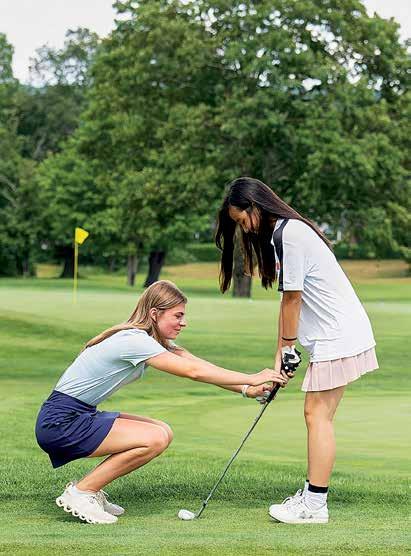
golf
PROGRAM
WHAT ARE THE DATES? TWO WEEKS: JULY 6–17, 2026 WHO
IS PLAYING?
I couldn’t have appreciated Coach Jan’s efforts more…. He is one of those people I could see myself spending every afternoon with, just getting better and better at golf.
Utilizing the facilities at the nearby Watertown Golf Club (Taft’s home course), this co-ed program is designed for the competitive golfer pursuing a high school or collegiate level program. All instructors are PGA certified and supplied by Peter Seaman’s Golf Shop.
The program offers a 5:1 student-toteacher ratio and accepts a maximum of 10 eligible students per session.
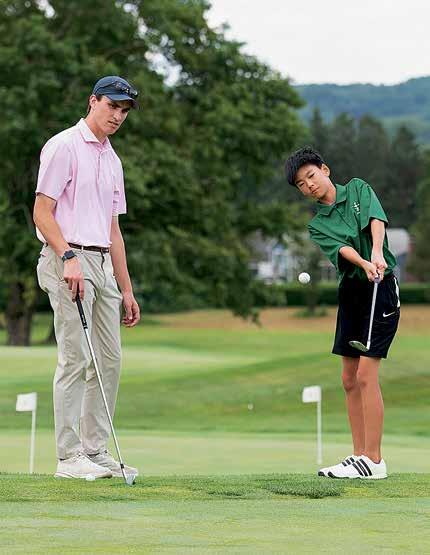
Participants must be enrolled in Summer@Taft’s academic program, either full-time or part-time. Each application must include a letter of recommendation from a golf professional, instructor, or coach, and participants must be able to provide a USGA certified handicap index of 16.5 for boys and 23.2 for girls or submit a video demonstrating skill level, subject to approval.
WHAT DOES THE SCHEDULE LOOK LIKE?
R Monday: Full Swing with Video, Fundamentals including Posture, Grip and Alignment
R Tuesday: Putting and Chipping, Fundamentals and Drills, Effective Practice to Score
R Thursday: Putting and Chipping, Reading the Greens and Specialty Shots (Lie & Slope)
R Friday: Full Swing with Drivers and Fairway Woods
Monday, Tuesday, Thursday, and Friday 2:30–4:30 p.m.
Session includes 2 hours of on-course instruction and course access on Sundays after 4:00 p.m.
HOW DO I APPLY?
Submit your complete Golf Program application (including eligibility requirements) online when you submit your Summer@Taft application. Payment of $750 is due before June 1.
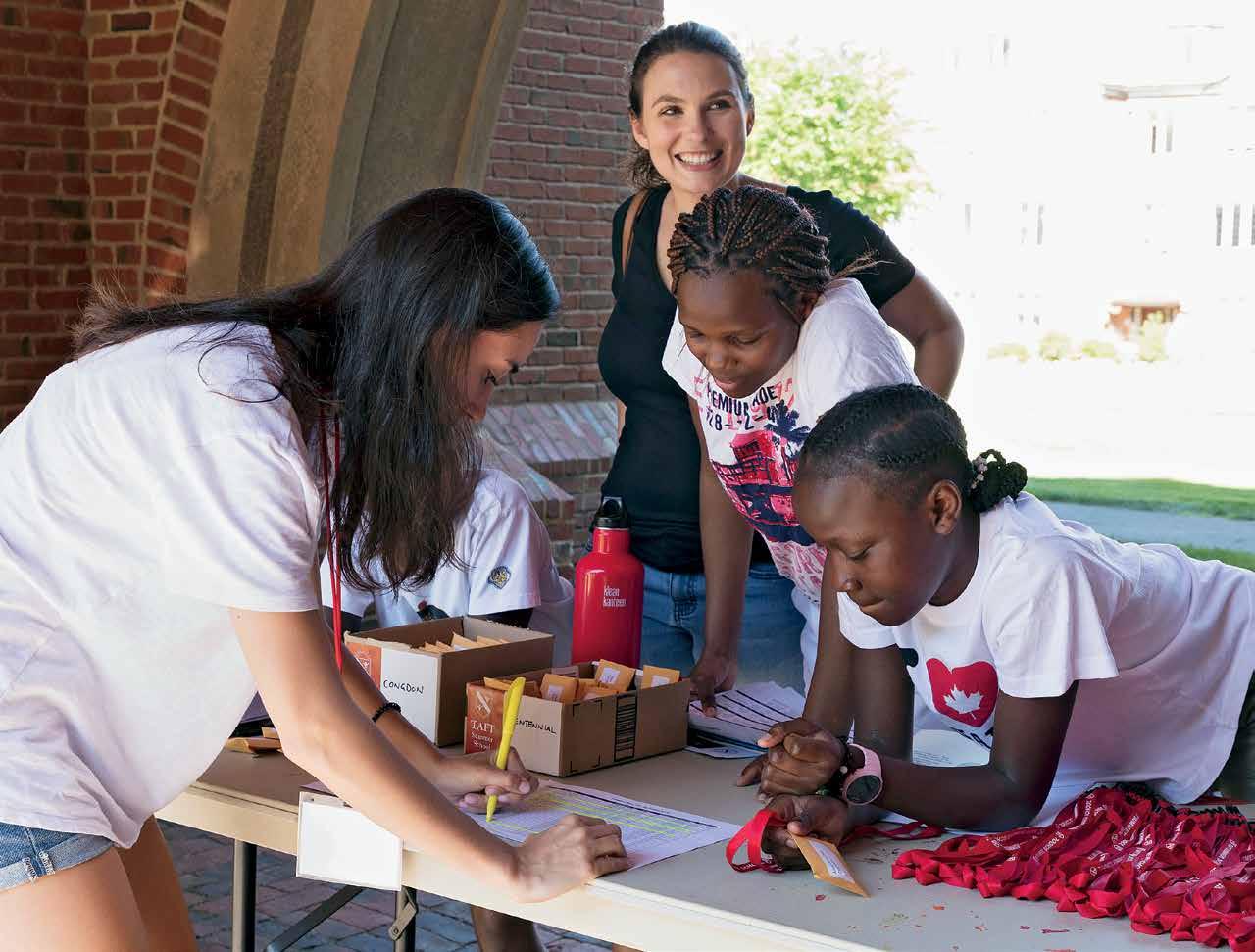
resources ADDITIONAL
Ryan T. Gemmell, co-director
Rebecca Swift, co-director
Cynthia Falcetti, program administrator
EMAIL summer@taftschool.org
PHONE
860-945-7961
FAX
860-945-7859
WEB
R taftschool.org/summer
R taftschool.leapfile.net
(secure website for document upload)
ADDRESS
The Taft School
Attn: Summer@Taft
110 Woodbury Road Watertown, CT 06795
COPY WRITING
Sarah Albee, Thomas Antonucci, Cynthia Falcetti, Ryan Gemmell, Lee Juvan, Kristina Kulikauskas, Kaitlin Orfitelli, Rebecca Swift, Summer@Taft Community
PHOTOGRAPHY
Miranda Brennan, Riley Brennan, Bob Falcetti, Kristina Kulikauskas, Zachary Shemms, Summer@Taft Community
DESIGN
Good Design, LLC
The Taft School actively seeks and admits students of any race to all its rights, privileges, programs and activities and does not discriminate on the basis of race, color, creed, sex, sexual orientation, or national origin in the administration of its policies and programs.
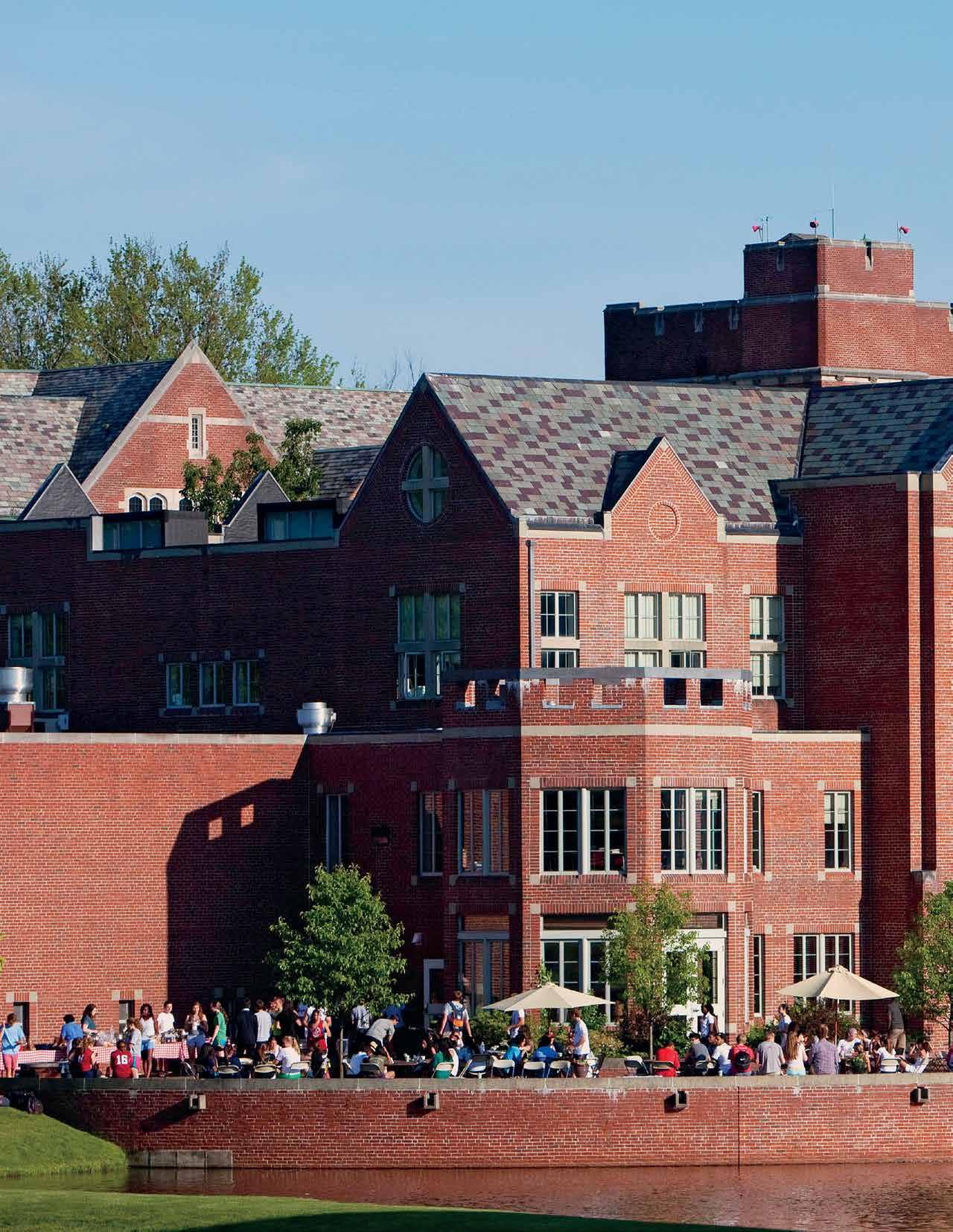
110 Woodbury Road
Watertown, CT 06795-2100
860-945-7961
summer@taftschool.org
taftschool.org/summer
